News

Dear Somalis,
The Somali Media Empire (SME) is the only Somali Media Outlet which shares and disseminates news and information as it occurs within Somalia and around the world, Somali Media Empire (SME) does not like corrupt political people within Somalia’;s political Mafia leadership and their foreign sponsors who have been confusing and misleading Somalis in #Somalia and around the world.
On behalf of the Somali Cyber Teams, Somali Media Outlets, Somali Scholars, Somali Authors, Somali Medical Doctors and Somali Civil servants, we really thank you for your collaboration and support to expose lies and bogus projects and political derailments in Somalia.
If you have information or news inc;luding recorded video footage regarding internal corruption please feel free to send us email or message us through our Somali media platforms as we are ready to share and publish it throughout our media platforms for public awareness.
Sincerely,
Somali Media Empire (SME)
Dear Somalis, Somali Government Officials, Somali Opposition Parties & The International Community,,
Minneapolis on Wednesday May 28, 2025 Somali people and the International Community are fed up with Somali criminal politicians who acts as useless and cunning chameleons, enjoying as parasitic bloodsuckers for the last three decades by using and strategizing tribal and political nepotism to reach, sett;e and accomplish their individualistic ambitions to occupy key Somali parliamentary and governmental posts

Truly, the Current Somali Political Opposition are not united and they do not abide by the the Somali Federal Provisional Constitution which has not been ratified by the Somali Lower and Upper Houses, and it is also true that the Lower and Upper Houses have amended 4 chapters of the Current Somali Federal Constitution that created political disagreement among us including semi-autonomous states.
However: the Somali Federal Government and its current leadership must invite political opposition before their tenure ends on May 15, 2026 in order to reach a deal to implement free and fair parliamentary and presidential elections on May 6, 2026.
The Somali people and the International Community are ready to support new and fresh political candidates whose political ambitions are based on shared religious and democratic values.
Stealing and swindling public and foreign aid financial assistance in order to bribe or finance your re-election to the Office of the Somali Presidency won’t happen so, it is better than never late!
If you want to run for a public office in #Somalia then you must tell us your income and how you made your fortune before running for public office in #Somalia.
Somalia is very rich in natural resources but Somali political Mafia must stop working for foreign entities who have invested interests in #Somalia, and we, the Somali people have more educated and well trained technocrats in Somalia and around the world therefore; we must collaborate to revive our national prestige and unity
This is my advice to you, have blessings for 24.7/12/365 Days wherever you stay or live in!
Sincerely,
Haji Dr. Badal W. Kariye
Author of 108 Books, ##Journalist, #Security Expert, & #Scholar
Sunday May 18, 2025

Mogadishu (HOL) – The Somali Ministry of Education and Higher Education has officially announced that this year’s National Secondary School Examinations will be held from June 14 to June 29, 2025, across most regions of the country.
In a press release on Saturday, the ministry urged graduating students to prepare thoroughly, highlighting that some changes have been made to the examination subjects. Notably, the subject of Business has been introduced for the first time, following the addition of ICT (Information and Communication Technology) in the previous year.
“We call on students to focus on their preparation as this year’s exams include new subjects, such as Business,” the statement read.
The ministry also noted that it would soon publish guidelines detailing the requirements for students, teachers, and examination supervisors to ensure a smooth and fair examination process.
The unified national exam—introduced to standardize education and certification across the country—is not implemented in Puntland, which maintains its own education curriculum, or Somaliland, which operates separately as a self-declared independent state.
This year’s exam comes amid financial concerns in some regions, such as SSC-Khaatumo, where students are being asked to pay a \$10 fee due to lack of federal funding—a departure from last year, when the federal government covered all exam-related expenses.
Sunday May 18, 2025

Mogadishu (HOL) – The leader of the SSC-Khaatumo administration, Abdikadir Ahmed Aw-Ali (Firdhiye), held a key meeting on Saturday with Chinese Ambassador to Somalia Wang Yi at the Chinese Embassy in Mogadishu, focusing on strengthening development ties and cooperation.
During the meeting, the two leaders discussed the longstanding partnership between Somalia and China, emphasizing extending strategic development support to the SSC-Khaatumo region.
Ambassador Wang Yi reaffirmed China’s commitment to Somalia’s growth, referencing bilateral agreements and initiatives under the Forum on China-Africa Cooperation (FOCAC). He highlighted that China is dedicated to launching sustainable, large-scale development projects across Somalia, including in emerging federal member states such as SSC-Khaatumo.
Firdhiye appreciated the warm reception and praised China’s continued support in Somalia’s state-building efforts. He emphasized the need for inclusive development, especially in conflict-affected and historically marginalized regions, noting that equitable progress is essential for lasting peace and unity.
The meeting signals growing international engagement with SSC-Khaatumo following its official recognition by the Federal Government of Somalia, as development actors increasingly explore ways to contribute to stabilization and reconstruction in the region.

Sunday May 18, 2025

The International Monetary Fund (IMF) said it has reached a staff-level agreement with Somalia on the third review under the Extended Credit Facility arrangement.
The IMF said in a statement issued on Friday evening that the deal would see the lender unlock 10 million U.S. dollars, which is subject to approval of the IMF Executive Board.
“Continued external assistance from multilateral and bilateral partners remains crucial to support the authorities’ policy efforts, especially in light of the high uncertainty and significant downside risks,” the IMF said.
The lender estimated a 4 percent growth in Somalia’s real gross domestic product in 2024, driven by continued agricultural recovery, while inflation is expected to ease to 5.6 percent by the end of 2024, supported by lower global commodity prices.
The IMF, however, said the country’s economic outlook in 2025 is clouded by foreign aid cuts, irregular rainfalls and high uncertainty in the country.
“Real GDP growth in 2025 is expected to slow to 3 percent amid weaker private consumption and imports. Inflation is projected to decelerate to 4.9 percent by the end of 2025, though the pace is slower than previously anticipated,” it said, adding that downside risks dominate the near-term outlook.
Fiscal reforms, according to the IMF, continue to progress steadily while the Somali authorities recognize the importance of accelerating efforts to build stronger public finances.
However, it warned that a more severe and sustained reduction in foreign aid would have long-term economic consequences, exacerbate food insecurity and poverty, deteriorate human development indicators, and jeopardize Somalia’s progress in rebuilding institutional capacity.
Friday May 16, 2025

Mogadishu (HOL) – A bloc of 103 members of Somalia’s bicameral Federal Parliament has issued a joint statement calling for President Hassan Sheikh Mohamud to resign, accusing him of gross constitutional violations, abuse of power, and failing to lead the country through deepening security, economic, and humanitarian crises.
In a Tuesday press release, the lawmakers accused the president of abandoning his constitutional responsibilities, including his March 29, 2025, pledge to convene a national dialogue with Somali political and cultural leaders. Instead, they allege he has pursued divisive policies that have further alienated the public and fractured national unity.
The parliamentarians charged the president with dismantling the National Consultative Council (NCC), interfering in the autonomy of federal member states, notably Puntland and Jubbaland, undermining the independence of key government institutions, engaging in corruption, secretive agreements, and widespread mismanagement, failing to uphold the constitution, which they say could be legitimate grounds for removal from office.
The lawmakers also expressed alarm over what they describe as a growing trend of authoritarianism, citing secret agreements signed without parliamentary oversight and the use of state resources to launch the newly formed Justice and Solidarity Party (JSP).
The demands come just hours after a similar statement from sixteen prominent Somali politicians, including former Presidents Sharif Sheikh Ahmed and Mohamed Abdullahi Farmaajo, and former Prime Ministers Hassan Ali Khayre, Mohamed Hussein Rooble, Omar Abdirashid Sharmarke, and Abdi Farah Shirdon (Saacid). That group accused the president of eroding Somalia’s federal system, particularly by turning the NCC into a partisan political platform.
At the heart of the criticism is the recent launch of the JSP, chaired by President Hassan Sheikh and backed by top federal officials. Critics say the party’s formation blurs the line between state and party, using public institutions for political gain at a time when the country faces threats from al-Shabaab, economic instability, and rising public discontent.
Despite the mounting pressure, President Hassan Sheikh and the Villa Somalia leadership have not yet responded formally to the joint call from MPs or the wave of criticism from political heavyweights. The developments signal a deepening political crisis that could further complicate Somalia’s efforts to stabilize and transition to universal suffrage.
Monday May 12, 2025

New York (HOL) – The United Nations is urgently seeking $41.6 million in extra-budgetary funding to support the newly established African Union Support and Stabilization Mission in Somalia (AUSSOM), as Security Council members met Monday for closed consultations on the mission’s financing amid ongoing threats from Al-Shabaab militants and fragile political stability in the country.
The behind-closed-doors meeting, requested by Somalia and the United Kingdom, focused on bridging the critical funding gap for AUSSOM, which replaced the AU Transition Mission in Somalia (ATMIS) on 1 January 2025. Although AUSSOM’s initial annual budget was projected at $190.2 million, a decision to maintain the current troop reimbursement rate of $828 per soldier per month—rather than increase it to $1,000—brought the revised budget down to $166.5 million.
Under a hybrid funding model outlined in UN Security Council Resolution 2719, the UN would contribute up to 75% of AUSSOM’s budget through assessed contributions, while the remaining 25%—about $41.6 million—must be raised through extra-budgetary support from the AU and the international community.
So far, just $14.5 million has been secured, including $10 million from the AU Peace Fund and $4.5 million in contributions from Japan and South Korea. This leaves a significant shortfall of $27 million, sparking concerns that delays in securing the funds could jeopardize AUSSOM’s operational readiness and momentum in stabilizing Somalia.
“The funding gap is a serious concern,” said a UN official familiar with the consultations. “Without timely support, the mission risks losing ground at a time when the security environment remains highly volatile.”
Resolution 2767, adopted in December 2024, endorsed the transition from ATMIS to AUSSOM and authorized AU member states to take “all necessary measures” to support the mission for an initial 12-month period. The resolution also made AUSSOM’s access to UN-assessed contributions contingent upon a further Security Council decision, expected by 15 May.
To make the hybrid funding model feasible, the UN undertook an independent strategic review (ISR) of the UN Support Office in Somalia (UNSOS). The review, led by experts Maman Sidikou and Neil Cole, identified $61.6 million in potential cost savings. Further consultations between the UN and AU led to additional cuts of $63.3 million, bringing total planned reductions to $124.9 million.
These reductions came through difficult trade-offs, including maintaining lower troop reimbursement rates, cutting aviation capabilities, excluding death and disability compensation from assessed contributions, and seeking voluntary funding for mine action services.
Despite broad support from many Council members—including the “A3 plus” group (Algeria, Sierra Leone, Somalia, and Guyana), EU members, China, Russia, and Pakistan—for applying the 2719 framework to AUSSOM, the United States has voiced strong opposition. A recent bill introduced by US senators seeks to prohibit American contributions to AUSSOM under the 2719 framework, arguing that Somalia is not an appropriate setting for such funding and advocating for alternative financing mechanisms.
As Monday’s consultations concluded, Council members remained divided over how best to ensure sustainable funding for AUSSOM. However, Al-Shabaab continuing to threaten regional stability, many in the Council emphasized the urgency of a coordinated and effective funding response.

By Paul Tilsley
Saturday May 3, 2025

Key leaders from the Somali National Army and the U.S. Embassy in Somalia speak while waiting for a C-17 Globemaster III aircraft with military equipment for the Danab in Mogadishu, Somalia, 28 February 2023. U.S. Air Force photo by Senior Airman William Rio Rosado
Fox News Digital has learned that the U.S. could withhold funding for the war against Islamist terror in Somalia until Europe, the African Union (A.U.) and the United Nations (U.N.) pay more of their “fair” share toward the cost of striking out and keeping the peace in the conflict-torn country.
These plans to “prohibit” the use of U.S. funds are key details, shown first to Fox News Digital, of a new bill to be introduced by three prominent Republican senators.
In line with President Donald Trump’s administration’s widespread moves to tighten fiscal controls in the U.S. and overseas, Sens. Jim Risch, R-Idaho., Chairman of the Senate Foreign Relations Committee Sen. Ted Cruz, R-Texas, and Sen. Rick Scott, R-Fla., are to introduce “the African Union Support and Stabilization Mission in Somalia (AUSSOM) Funding Restriction Act of 2025.”
This is “to safeguard U.S. taxpayer funds and hold the U.N. and A.U. accountable in African peace operations,” Risch told Fox News Digital.
The bill also seeks to mandate the U.S. to oppose any U.N. Security Council action which enables such funding.
The East African country of Somalia has been wracked for decades by attacks and insurgency from Islamist terrorists, both from ISIS and the al Qaeda-linked al-Shabab. In just the past five weeks, U.S. Africa Command reported that it has carried out four airstrikes; three against ISIS terrorists and one against al-Shabaab. At least one of these strikes, the command stated, was against multiple targets.
Chairman Risch told Fox News Digital, “The Trump Administration has taken decisive action to counterterrorist groups across Africa, and I’m very supportive.”
However, officials from the European Union, according to Risch, plan to skew payments for the AUSSOM peacekeeping and stablization operation more toward the U.S.; in other words, make the U.S. pay more than it should, he said.
“At the U.N., our European partners are looking to skirt their financial commitments to AUSSOM in Somalia by switching to a new imbalanced funding mechanism that pushes the burden on Americans,” he stated.
“We can’t let that stand,” Risch continued. “This bill will prohibit U.S. contributions to AUSSOM under this new funding scheme, until the A.U. and the U.N. can prove that they are using the funds they have responsibly, and prevent Americans from being locked into perpetually funding a broken system.”
Risch said, “President Trump has ushered in a new era of American foreign policy where American taxpayer dollars will be used only to secure a safe and prosperous America. For far too long, our allies have taken America for a ride, and profited off of America paying the lion’s share for global security. Europe must continue to shoulder this burden.”
The other two senators sponsoring the bill, Cruz and Scott, also serve on the Senate Foreign Relations Committee.
Scott told Fox News Digital, “The United States will not allow our tax dollars to be exploited by the U.N. while our partners refuse to pay their fair share, much less for a mission that fails to spend these dollars responsibly or transparently. I am proud to join my colleagues on the AUSSOM Funding Restriction Act to ensure Americans’ interests are put first, and their tax dollars spent wisely.”
The specific aims of the bill that have been shown to Fox News Digital are:
- Protect U.S. Taxpayer Funds: Prohibit U.S. financial contributions to AUSSOM under UNSCR 2719 and mandate U.S. opposition to any U.N. Security Council action enabling such funding.Ensure Rigorous Oversight: Require the Secretary of State to conduct annual, independent assessments of the A.U.’s compliance with UNSCR 2719 criteria for all A.U.-led peace operations.
- Enhance Transparency and Accountability: Mandate comprehensive reporting to Congress on the assessment findings, AUSSOM’s performance and funding, and any U.S. contributions under UNSCR 2719.
- Strengthen Congressional Consultation: Expand existing State Department briefings to include specific updates on A.U. peace operations funded under UNSCR 2719.
Thursday May 1, 2025

Mogadishu (HOL) — Somali Lower House Speaker Sheikh Aden Mohamed Nur Madoobe departed for Algeria on Thursday to attend the upcoming Arab Parliament Speakers Summit, scheduled to take place in the coming days.
The speaker’s trip comes amid heightened political tension in Somalia, following a chaotic lower house session on Wednesday that was marred by clashes between rival lawmakers.
The unrest stemmed from the controversial expulsion of MP Abdullahi Hashi Abiib, who Speaker Aden Madoobe removed in March for missing two consecutive sessions without a formal excuse—an action widely criticized by opposition lawmakers as politically motivated.
Hours before his departure, Speaker Madoobe issued a directive suspending 20 lawmakers from attending future parliamentary sessions, citing security concerns. The suspended MPs include vocal critics of the speaker and cabinet members who have accused him of violating parliamentary procedure and abusing his authority.
“The speaker has become both the accuser and the judge,” said one of the suspended MPs, who spoke to HOL on condition of anonymity.
The Arab Parliament Speakers Summit will bring together heads of legislative bodies from across the Arab world to discuss regional cooperation, legislative harmonization, and shared political challenges.
The Somali Parliament remains in recess following Wednesday’s disruption, with no clear indication when regular sessions will resume.

Mogadishu (HOL) — Somali Lower House Speaker Sheikh Aden Mohamed Nur Madoobe has referred the disputed case of parliamentary seat HOP#201—currently held by MP Abdullahi Hashi Abiib—back to the Standing Committee on Bylaws, Welfare, Ethics and Immunity for review and guidance.
The move comes amid mounting pressure from opposition lawmakers who recently submitted a motion to impeach the speaker over his handling of the case.
In a press release on Tuesday, Speaker Madoobe said he made the decision after considering the concerns and recommendations raised by members of the House of the People. He cited Article 50, Section 2, Subsection (D) of the chamber’s bylaws, which grants the Standing Committee the authority to review matters related to parliamentary procedure and member conduct.
“The matter regarding the seat HOP#201 has been returned to the appropriate Standing Committee for legal consultation and advice,” the statement read. “Their recommendations will guide the next steps.”
The controversy began on March 15, when Speaker Madoobe announced that MP Abdullahi Abiib had been stripped of his seat for missing two consecutive sessions without presenting a valid excuse. That decision sparked criticism from a number of lawmakers, who argued that the speaker had overstepped his authority.
MP Abiib, a prominent critic of the current administration, has frequently accused senior government officials of corruption. He has also submitted documentation to international organizations alleging governance failures and irregularities in public finance. In 2023, Abiib claimed to have received threats from government officials and said he could not safely return to Mogadishu.
Critics of the speaker say the attempt to expel Abiib is politically motivated and violates parliamentary immunity protections. Several MPs have warned that allowing such precedent would endanger dissent within the legislature.
The Standing Committee is now expected to issue a formal recommendation regarding the legality of the speaker’s original decision. It remains unclear whether the House will hold a vote on the matter once the committee presents its findings.

Wednesday April 30, 2025

(From L to R) Somalia’s Minister of Foreign Affairs and International Cooperation, Abdisalam Abdi Ali, Egypt’s Foreign Minister Badr Abdelatty
Egypt’s Foreign Minister Badr Abdelatty held a phone call on Monday with Somalia’s newly appointed Minister of Foreign Affairs and International Cooperation, Abdisalam Abdi Ali, congratulating him and reaffirming Egypt’s support for Somalia’s stability and unity.
Ministry spokesperson Ambassador Tamim Khalaf stated that Abdelatty conveyed congratulations on the appointment and wished his counterpart success. During the call, Abdelatty emphasised the “depth of the historical relations and fraternal ties” between the two nations.
He highlighted the elevation of these ties to a strategic partnership level in January 2025, during Somali President Hassan Sheikh Mohamud’s visit to Egypt, underscoring the importance of continued bilateral cooperation in political, economic, and security spheres for mutual benefit.
According to the spokesperson, Abdelatty affirmed Egypt’s “full commitment to supporting Somalia’s unity, territorial integrity, its national institutions, and efforts to achieve security and stability,” describing Somalia’s stability as crucial for peace in the Horn of Africa. He reiterated Egypt’s readiness to stand by Somalia in confronting terrorism and extremism and provide counter-terrorism support.
The two ministers also exchanged views on enhancing coordination to bolster stability and development in the Horn of Africa region. They agreed on the importance of maintaining close consultation within regional and international forums to address shared challenges.
The Somali minister, according to the statement, expressed appreciation for Egypt’s supportive stances towards Somalia. He specifically valued Egypt’s participation in the African Union mission in Somalia, undertaken at the request of the Somali federal government, and acknowledged Egypt’s ongoing commitment to his country’s security and stability.
#BreakingNews
The Somali Federal President H.E. Hassan Sheikh Mohamud ordered the Somali Federal Prime Minister H.E. Hassan Hamza Abdi Barre and his delegation to visit #SSCKhatumoState where he will meet #KhatumoState President H.E. Firdiye, traditional elders and the People of Khatumo State Government soon. The Somali Federal Government and the Khatumo State Government sign contractual deals and tenders as well as establishing stable relations as #Somaliland and #Puntland States are not happy such political move which the Somali Federal Government decided to start in Khatumo State Government.


Wednesday April 30, 2025

Canadian Prime Minister Mark Carney says during the Liberal Party’s election night event in Ottawa, Canada, that Canadians must stay united against threats from the US [Jennifer Gauthier/Reuters]
Canadian Prime Minister Mark Carney’s Liberal Party will form a minority government after an election race dominated by concerns over United States President Donald Trump’s threats against Canada.
With nearly all votes counted late on Tuesday, the Liberals had won 169 seats in the 343-member House of Commons, falling just short of a majority.
The main opposition Conservative Party, led by Pierre Poilievre, won 144 seats.
The Liberals’ victory gives them a fourth consecutive term, a stunning turnaround for a party that had been trailing the Conservatives by as much as 25 percentage points as recently as January.
After two years of poor polling for the Liberals, Trump’s decision to impose tariffs on Canadian goods coupled with the Republican leader’s repeated threats to make Canada the 51st US state helped rally many Canadian voters behind the incumbent government.
The resignation of Carney’s predecessor, former Prime Minister Justin Trudeau, also helped the party regain support after Trudeau faced months of widespread criticism for his government’s handling of a housing crisis and other affordability issues.
Reporting from Canada’s capital, Ottawa, on Tuesday, Al Jazeera’s John Hendren said many voters had said they “wanted to make sure that they were picking a leader who could combat Trump, the one major threat facing the country”.
“Canadians looked at this election, and they saw an existential crisis – that crisis being the fact that 80 percent of their exports go to the United States, their biggest trading partner, and those tariffs were making it hard to do business,” Hendren said.
The top priority now for Carney, a former central banker, will be to address the Trump administration’s tariffs, he added.
“And if he can’t do that in short order, his honeymoon might be short-lived,” Hendren said.
In a statement on Tuesday afternoon, Carney said he had spoken to Trump and that the US president congratulated him on his victory.
“The leaders agreed on the importance of Canada and the United States working together – as independent, sovereign nations – for their mutual betterment. To that end, the leaders agreed to meet in person in the near future,” the statement from Carney’s office read.
With a minority government, the Liberals will need the support of an opposition party to pass legislation and survive no-confidence votes in parliament.
The left-leaning New Democratic Party (NDP), which had until late last year been propping up the Trudeau government, appears poised to play that role.
The NDP won seven seats in Monday’s elections – enough to push the Liberals past the 172-seat threshold needed in the House of Commons.
During his victory speech after Monday’s vote, Carney urged Canadians to remain united in the face of Trump’s threats.
“America wants our land, our resources, our water, our country,” he said. “President Trump is trying to break us so that America can own us; that will never … ever happen.”
Meanwhile, Poilievre congratulated Carney on his victory and said his party would “do our job to hold the government to account”.
Poilievre, who lost his seat in Ottawa, had been widely expected to be Canada’s next prime minister before Trump’s threats and the Liberal Party leadership shake-up upended the race.
Source: Al Jazeera
#Breakinnews #Somalia‘s exremely failed #PrimeMinister H.E. Hamsa Abdi Barre made a minor cabinet reshuffle in order to hide ongoing failures in #Somalia
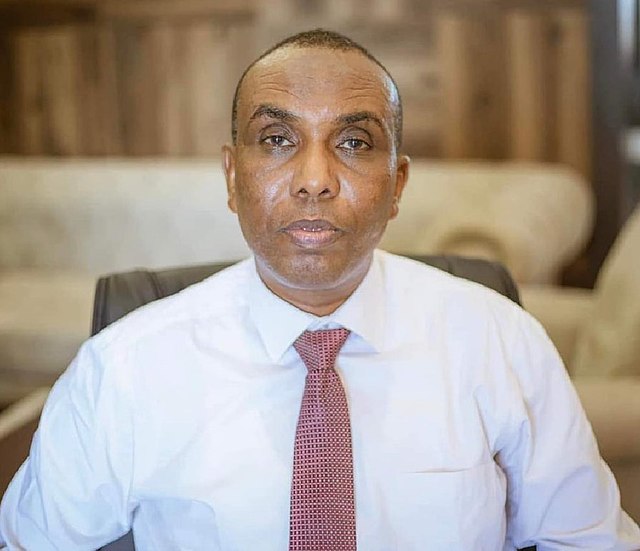
Monday March 17, 2025
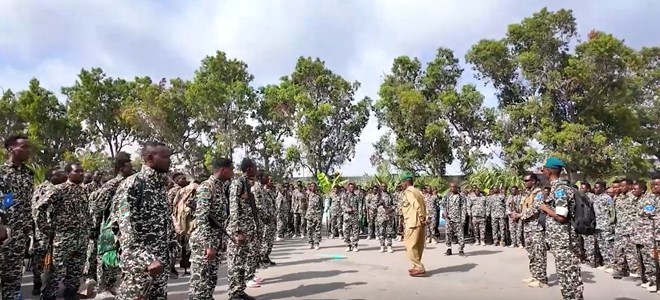
Mogadishu– The Somali Custodial Corps has been deployed to the Middle Shabelle region to support ongoing military operations against Al-Shabaab on Sunday, despite concerns over their combat readiness.
Before their deployment, the Commander of the Custodial Corps, General Mahad Abdirahman, urged the troops to uphold their duties and maintain the front lines in the fight against the militant group.While the corps’ primary role is to protect prisons and oversee their administration, the commander emphasized their contribution to national security efforts.
However, security analysts have raised concerns about the effectiveness of the Custodial Corps in direct combat, noting that they lack formal military training, particularly in counterterrorism operations.
Despite this, some of the soldiers expressed their commitment to defending the nation, stating that they are prepared to fulfill their oath and fight alongside military forces.
The ongoing fight against Al-Shabaab and ISIS is largely being carried out by Somali forces trained by the U.S. and Turkish governments, who have received specialized counterterrorism training.
Prime Minister Hamza Abdi Barre recently encouraged troops to remain steadfast in their mission, assuring them of the government’s full support as they work to eradicate terrorist threats.
Major military operations are currently underway in Middle Shabelle and Hiiraan, marking one of the largest offensives in two years. According to government reports, Somali forces have killed nearly 200 Al-Shabaab militants in the past two months alone.
Monday March 17, 2025
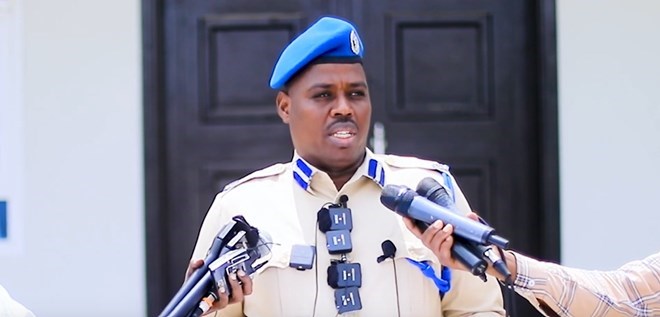
Mogadishu– Mogadishu police have arrested a traffic officer accused of fatally shooting an auto-rickshaw operator at the Four Gardens intersection on Sunday, an incident that sparked violent protests by local youth and motorcycle riders.
Angry demonstrators set fire to a police vehicle in response to the killing, expressing frustration over what they see as recurring violence by security personnel against auto-rickshaw operators.
Somali Police Spokesperson Abdifitah Hassan Adam confirmed the officer’s arrest, stating that he is in the Criminal Investigation Directorate’s custody (CID) custody and will face justice.
“The suspect in the murder, who was a member of the traffic police, has been arrested and is being held by the CID. It will not be acceptable to destroy public property. The person who committed the crime is responsible for the crime,” said the police spokesperson.
Witnesses reported that the altercation began as a verbal dispute between the officer and the motorcycle driver before the officer drew his weapon and opened fire.
Similar incidents have occurred in Mogadishu in recent years, with disputes between security personnel and auto-rickshaw operators often escalating into deadly confrontations.
The killing has reignited public concerns over police accountability and the use of force against civilians.
Mogadishu Thursday March 13, 2025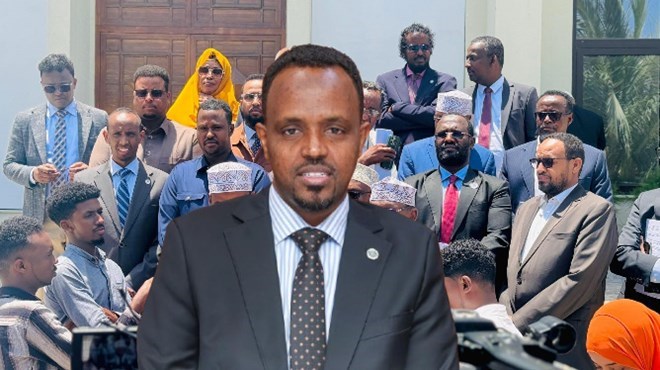
Somali Deputy Minister of Information Abdirahman Sheikh Yusuf Al-Adaala (foreground) faces mounting pressure from opposition lawmakers (background) after accusing some MPs of echoing Al-Shabaab rhetoric. The controversy has escalated into a parliamentary summons, deepening political tensions in Mogadishu.
Mogadishu (Somalia) — Somali lawmakers will summon Deputy Minister of Information Abdirahman Sheikh Yusuf Al-Adaala to parliament following remarks in which he accused some MPs of echoing Al-Shabaab’s rhetoric.
The dispute arose after Al-Adaala claimed in a Facebook post that lawmakers advocating for President Hassan Sheikh Mohamud’s resignation were serving as spokespeople for the militant group. His comments sparked outrage among opposition MPs, who condemned the allegations as an attack on the legislature’s integrity.
MP Abdirashid Jilley, a vocal critic of the government, said the remarks were baseless and called for the deputy minister to provide evidence to support his claims. “The idea that a government official would accuse MPs of sympathizing with Al-Shabaab is unacceptable,” Jilley stated. He also accused Al-Adaala of directing Somali National Television (SNTV) to censor content related to opposition legislators.
The controversy follows claims that more than 100 MPs have signed a motion calling for President Mohamud’s resignation, citing his failure in leadership. However, opposition lawmakers have yet to release an official list of signatories. Footage from a press conference outside parliament on Wednesday showed over two dozen MPs addressing the media, but no verifiable documentation confirming the signatures has surfaced.
Al-Adaala, a key figure in the government’s communications strategy, has previously been at the center of disputes over his rhetoric against political opponents. His latest comments further fuel tensions between the administration and lawmakers critical of the president’s leadership.
It remains unclear when Al-Adaala will be summoned, but opposition MPs insist he must explain to the House of the People. The controversy underscores growing political divisions in Somalia as the country navigates security and governance challenges.
#Happy #InternationalWomensDay to our beloved and dear mothers and sisters around the world, I wish you all the best.

Wednesday March 5, 2025
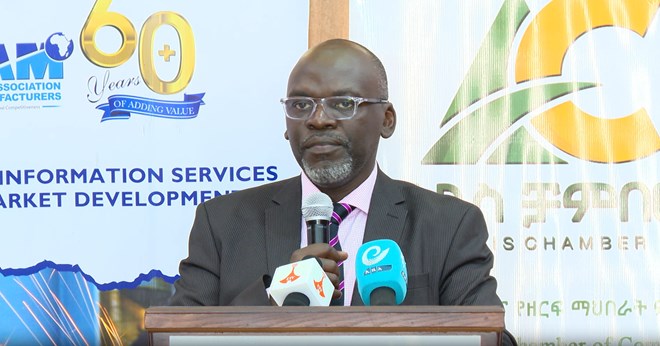
Ethiopia’s ability to plug into African Continental Free Trade Area (AfCFTA) positions it a gateway for Kenya to the broader North Africa, Kenya Association of Manufacturers (KAM) CEO Tobias Alando said.
Addressing the Ethio-Kenya Business Conference held in Addis Ababa today, Alando said Kenya and Ethiopia “can work jointly to even access other countries around us. So, this collaboration will benefit both countries.”
The CEO added that Kenya is proud to associate with businessmen and women of Ethiopia, stating his belief that Ethiopians are also proud to associate with Kenyan businessmen and women.
Addis Ababa Chamber of Commerce and Sectoral Associations Acting Secretary General, Zekarias Assefa, said Ethiopia and Kenya have sustained long years of diplomatic relations dating back to the early 20th century.
The diplomatic ties of the two nations have resulted in fostering bilateral trade and investment ties in areas of agriculture, tourism and other sectors of the economy.
He pointed out that various institutions of the two countries are at present exerting efforts to promote economic and social development.
Kenya’s Ambassador to Ethiopia, George Orina, said the Ethiopian market has undergone significant changes recently.
The opportunities here are abundant, he noted, adding that the National Bank of Ethiopia has for instance introduced reforms in the foreign exchange regime in July 2024 to allow banks and investors to buy and sell foreign currency.
On his part, Yohannes Fanta, Director-General at Ministry of Foreign Affairs, said Ethiopia and Kenya have enjoyed a long standing and exceptional partnership founded on the principles of mutual respect, consistency, and understanding.
“Given the enormous potential offered by our two countries, there is a huge trade and investment opportunity for our people to cooperate and work closely.”
The Ethio-Kenya Business Conference was organized by Addis Ababa Chamber of Commerce and Sectoral Associations and Kenya Association of Manufacturers.
Wednesday March 5, 2025
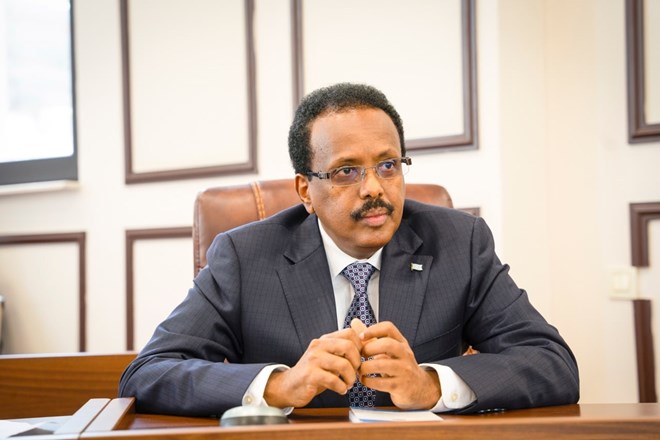
Mogadishu (HOL) – Former Somali President Mohamed Abdullahi Farmaajo has reiterated that the fight against Al-Shabaab and ISIS is a national obligation, not a matter of political ideology or partisanship.
In a statement issued Tuesday night, Farmaajo emphasized the importance of unity among Somalis to prevent militant groups from exploiting political divisions.
“It is our duty to stand with the brave Somali National Army, who are confronting the enemy on all fronts, particularly in Middle Shabelle. This is not about conservatism or opposition but a national responsibility and a historical obligation,” Farmaajo said.
He urged Somalis to support the government and Puntland forces in their campaign against Al-Shabaab and ISIS, warning against the misinformation spread by the militant groups.
“I stress the importance of collective efforts to eliminate terrorist organizations so that Somalia can achieve lasting peace and our people can live with dignity and full sovereignty,” he added.
Al-Shabaab, an Al-Qaeda affiliate, has demonstrated resilience despite sustained military offensives. The group has reportedly retreated into rural areas to regroup and launch asymmetric attacks. Analysts note that while airstrikes and ground offensives have weakened its operational capacity, a long-term strategy—integrating governance, intelligence coordination, and local alliances—is essential to dismantling the insurgency.
The Somali government has pledged to maintain military pressure on Al-Shabaab, describing its current operations as a “decisive phase” in the ongoing fight against the militants.
Tuesday March 4, 2025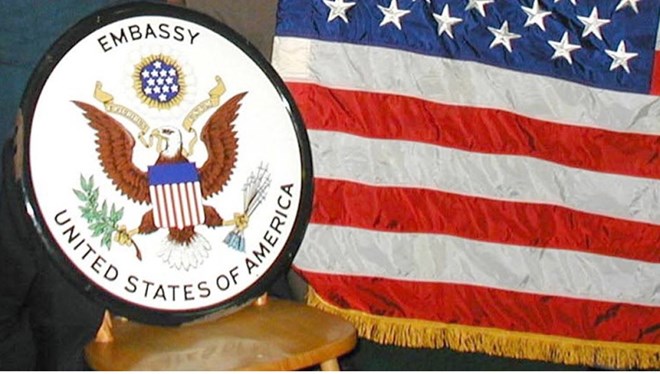
[File: Osman Hassan/AP]
Mogadishu (HOL) — The U.S. Embassy in Somalia issued security alert on Tuesday evening, warning of “potential imminent attacks” targeting multiple locations, including Mogadishu’s Aden Adde International Airport. The advisory follows a surge in Al-Shabaab attacks across central Somalia, where militants have launched coordinated assaults, seized key towns, and advanced closer to the capital.
“All movements of U.S. Embassy Mogadishu personnel have been cancelled until further notice,” the embassy stated, citing “credible information” about the threats. The U.S. Department of State’s Level Four travel advisory for Somalia remains in effect, urging U.S. citizens to avoid travel due to “crime, terrorism, civil unrest, health issues, kidnapping, and piracy.”
The security alert follows weeks of intensified militant activity that has exposed shortcomings in Somalia’s counterinsurgency efforts. Since February 20, Al-Shabaab has launched at least nine attacks across Middle Shabelle and Hiraan, temporarily seizing several towns, including Balcad—just 30 kilometres from Mogadishu—before being repelled by Somali forces.
The Somali government, backed by U.S. Africa Command (AFRICOM) airstrikes, has countered the offensive, killing over 130 militants in recent clashes, according to official statements. However, Al-Shabaab has released photographic evidence of its fighters occupying government buildings in multiple locations, raising concerns about the group’s ability to regroup and exploit security gaps.
The U.S. Embassy emphasized that “terrorists continue to plot kidnappings, bombings, and other attacks” in Somalia, often with little or no warning. High-risk targets include government buildings, military convoys, hotels, restaurants, shopping areas, and other public gathering spaces frequented by Westerners. The militants have used car bombs, suicide attacks, small-arms assaults, and mortar fire in recent operations.
The U.S. government has reiterated its limited capacity to provide emergency services to U.S. citizens in Somalia due to the lack of a permanent consular presence. American citizens currently in the country are urged to exercise heightened caution, remain vigilant, and enroll in the Smart Traveler Enrollment Program (STEP) for real-time security updates.
The Libya Observer
by Abdulkader Assad
Tuesday February 25, 2025
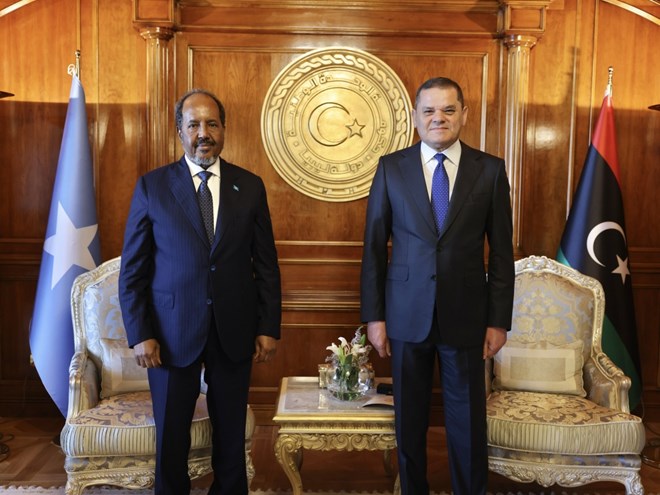
The Prime Minister of the Government of National Unity, Abdul Hamid Dbeibah, and the President of Somalia, Hassan Sheikh Mahmoud, witnessed on Monday the signing of a memorandum of cooperation between the municipalities of Tripoli and Mogadishu to support partnership in the areas of local administration and urban development.
A number of other memoranda were also signed, including mutual exemption from entry visas for holders of diplomatic, special and service passports, in addition to an agreement for political consultation between the two foreign ministries to enhance diplomatic coordination on issues of common interest, according to Hakomitna media platform.
The two sides agreed to form a joint high-level committee to review previous agreements, discuss Libyan investments in Somalia, and enhance economic and development cooperation. They stressed the importance of joint coordination on regional issues, especially in the Horn of Africa region, in light of the role that Somalia will play after its election to the UN Security Council to contribute to supporting regional stability and security and enhancing cooperation.
Somali President Hassan Sheikh Mahmoud arrived in the capital, Tripoli, on Sunday evening, at the head of a high-level delegation on an official visit to Libya, according. The Somali President and his accompanying delegation were received at Mitiga Airport in Tripoli by the Acting Foreign Minister, Taher Al-Baour.
Puntland
Tuesday January 21, 2025
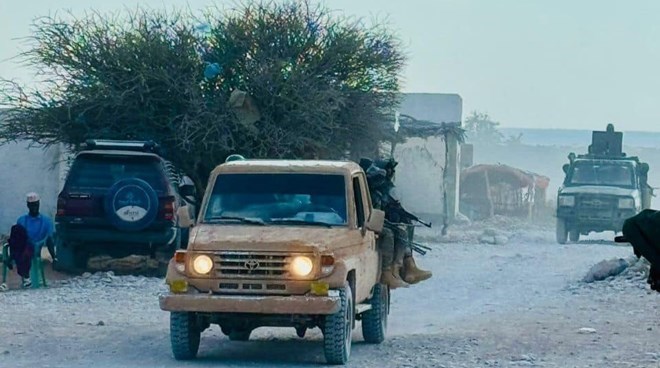
Garowe (HOL) – At least 13 Puntland soldiers were killed and over seven others injured in a landmine explosion in the Habley area of the Bari region on Monday.
The explosion struck an army vehicle transporting Puntland forces engaged in a counter-terrorism operation against ISIS militants in the region. According to Puntland military officials who spoke with Hiiraan Online, the attack was carried out by the ISIS group, using a roadside mine to target the convoy.
Some of the injured succumbed to their wounds, raising the death toll. The number of injuries is reported to be lower than the fatalities.
Just two days earlier, Puntland officials had visited Tasjiic to gather community support, including livestock donations, aimed at boosting the morale of security forces involved in operations against ISIS.
The attack highlights the escalating challenges faced by Puntland forces in their campaign to dismantle ISIS strongholds in the mountainous areas of Bari.
Tuesday January 21, 2025
Mogadishu (HOL) – Former Somali President Mohamed Abdullahi Farmaajo has criticized the ruling leadership for pursuing constitutional amendments and elections that exclude Puntland, Jubaland, and key political stakeholders, calling the actions a threat to national unity and stability.
In a statement released Monday, Farmaajo expressed concerns about the country’s political trajectory, warning that unilateral decisions could lead to setbacks, weaken national unity, and create political turmoil undermining Somalia’s security.
“We have repeatedly cautioned that any incomplete amendment to the Constitution risks dismantling the legal framework underpinning government institutions. This framework is built on a mutually agreed constitution,” said Farmaajo.
The former president criticized President Hassan Sheikh Mohamud for proceeding with elections without inclusive participation. Farmaajo labeled the move as unilateral and warned it could lead to political instability.
“Elections and constitutional changes that exclude Puntland, Jubaland, and other political leaders disregard the unity and solidarity of the nation. Such actions reflect leadership that prioritizes personal interests over the collective good,” Farmaajo said.
He urged President Hassan Sheikh Mohamud to abandon what he described as centralized decision-making, warning it could incite division and political chaos. Farmaajo called on regional states, former heads of state, and members of both parliamentary houses to collaborate on a national dialogue to address Somalia’s political challenges and avoid further instability.
Farmaajo’s statement follows the National Electoral Commission and Boundaries’ announcement of the opening of political organization registrations for the upcoming one-person, one-vote elections.
The commission’s chairman, Abdikarin Ahmed Hassan, emphasized that previously registered political organizations must meet updated requirements and comply with the new electoral laws, while new entities must follow official registration procedures.
Daily News Tanzania
Sunday December 22, 2024
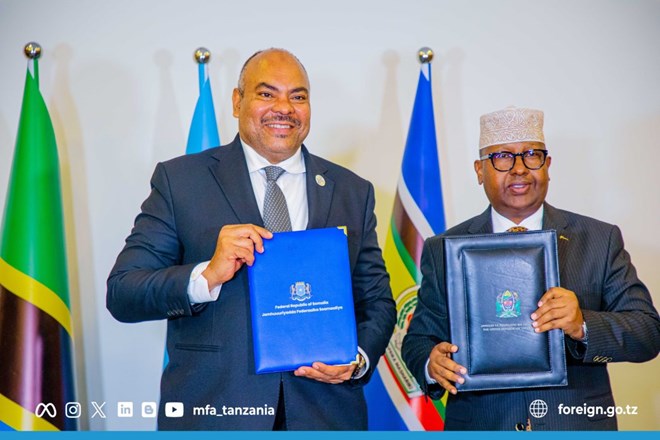
SOMALIA: TANZANIA and Somalia have signed multiple agreements aimed at enhancing the bilateral relations between the two countries.
The pacts signed in Mogadishu on Thursday address cooperation in defence, tourism, health, aviation and general diplomacy, promising a new era of collaboration between the two East African neighbours.
In the health sector, the agreements aim to facilitate medical training, share expertise and manage public health crises, especially after recent regional pandemics.
This involves joint research projects, sharing of medical resources and coordinated responses to health emergencies.
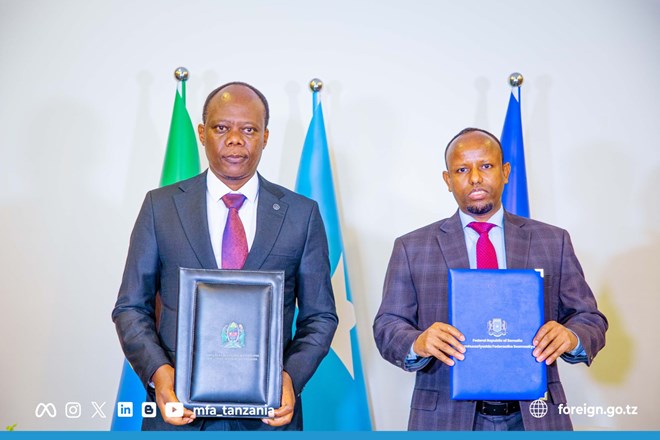
During the signing ceremony of the health agreements, Tanzania was represented by the Deputy Minister for Health, Dr Godwin Mollel, on behalf of Minister for Health Jenista Mhagama.
The agreements focus on key areas that will strengthen the well-being of the citizens of both countries.
Key areas to be emphasised include specialised and super specialised expertise, the exchange of human resources for the health sector between the two countries and building the capacity of health workers.
Other important areas include research and innovation, the availability of health commodities and digital health services.
Emphasis will also be placed on medical tourism, sharing experiences and the management of the healthcare supply chain, alongside seeking resources to improve healthcare services.
On strategic partnership in defence the collaboration is intended to bolster counter-terrorism efforts, enhance maritime security in the Indian Ocean and share intelligence to combat regional threats. Both nations have faced challenges from piracy and insurgent groups, making this cooperation essential for regional peace.
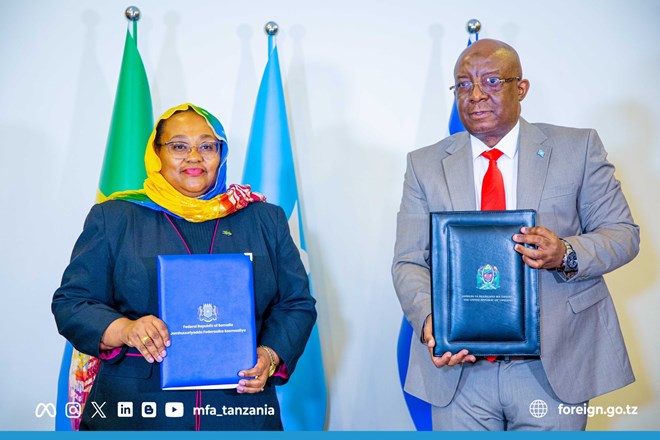
The agreements highlight an initiative to promote tourism, tapping into Tanzania’s established attractions like Zanzibar and Mount Kilimanjaro and Somalia’s emerging cultural heritage sites. Cultural exchanges are expected to foster mutual understanding and appreciation between the peoples of both countries.
One of the most anticipated aspects of the deal is the establishment of direct flights between Mogadishu and Dar es Salaam. This move not only aims to boost trade but also to simplify travel for business, tourism and personal exchanges.
The improvement in air connectivity is expected to serve as a catalyst for economic growth by reducing travel times and costs.
Beyond sector-specific agreements, there’s a broad commitment to cooperation in education, trade and environmental conservation. This includes scholarships for students, trade facilitation and joint efforts in climate change mitigation, acknowledging the shared environmental challenges.
The agreements are the culmination of discussions initiated during President Hassan Sheikh Mohamud’s visit to Dar es Salaam earlier this year. His talks with President Samia Suluhu Hassan were marked by a shared vision for the development and stability of East Africa.
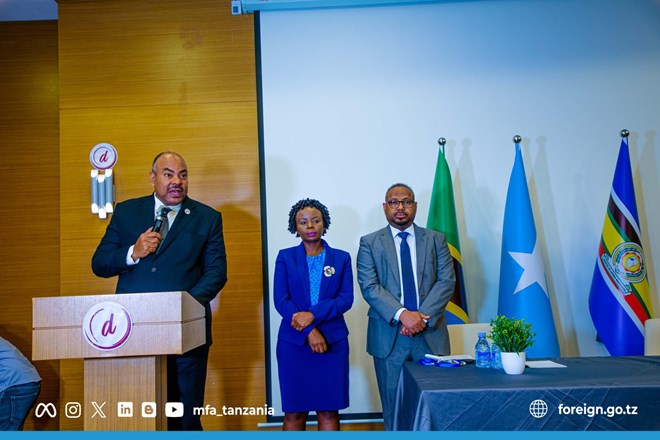
The ceremony in Mogadishu was attended by high-ranking officials from both countries, including ministers for foreign affairs, defence and tourism.
The Tanzanian delegation was led by the Minister for Foreign Affairs and East African Cooperation, Mohammed Thabit Kombo, accompanied by Minister for Natural Resources and Tourism, Ambassador Dr Pindi Chana.

Sunday December 22, 2024

ADDIS ABABA, ETHIOPIA — French President Emmanuel Macron said his country supports Ethiopia’s quest for access to the sea through discussion and respecting international laws and neighboring countries.
Macron spoke on Saturday after a one-day visit to Addis Ababa, where he held bilateral talks with Ethiopian Prime Minister Abiy Ahmed.
During a news conference, Macron welcomed the Ankara Declaration reached by the Federal Democratic Republic of Ethiopia and the Federal Republic of Somalia on Dec. 11.
In the declaration, brokered by Turkish President Recep Tayyip Erdogan, “the leaders of Somalia and Ethiopia reaffirmed their respect and commitment to one another’s sovereignty, unity, independence and territorial integrity, as well as the principles enshrined in international law, the Charter of the United Nations and the Constitutive Act of the African Union.”
The two sides also agreed to start “technical negotiations” by February on details of Ethiopia’s sea access, and that those negotiations would be facilitated by Turkey and be “concluded and signed” within four months.
The breakthrough came after an almost yearlong dispute between Somalia and Ethiopia that began Jan. 1 when Somaliland’s former president, Muse Bihi Abdi, and Ethiopia’s Abiy signed a memorandum of understanding to lease 20 kilometers of Somaliland seafront to Ethiopia for 50 years, in return for diplomatic recognition.
The Somali government rejected the deal and accused Ethiopia of a “blatant violation” of its sovereignty and territorial integrity.
On Saturday, President Macron expressed his readiness to support Ethiopia’s legitimate quest for sea access.
He said France is interested in playing its part in facilitating ways in which sea access can be achieved responsibly through talks, in a way that recognizes international laws and respects neighboring countries.
Abiy said the two leaders have thoroughly discussed his country’s pursuit of peaceful access to the Red Sea. He said the French president accepted Ethiopia’s request for support in its quest for sea access through international law, peacefully and diplomatically.
“The ties between our two nations continue to be strengthened and I look forward to our discussions during his stay in Ethiopia,” Abiy said of Macron in a post on X.
Macron also touched on a domestic issue in Ethiopia: the implementation of the Pretoria agreement signed in November 2022 by Ethiopia’s federal government and the Tigray People’s Liberation Front that ended a deadly two-year war.
Macron said France is keen to support those affected by the conflict and would like to see the rule of law upheld through the transitional justice process.
Abiy and Macron also toured Ethiopia’s newly renovated National Palace in Addis Ababa, the former home of emperor Haile Selassie that was restored with the help of 25 million euros provided by the French Development Agency. The Ethiopian government plans to open it to the public as a museum.
French architects and other professionals have also participated in the renovation process, Macron said.
According to Macron, France is also providing funding and technical support for ongoing renovation at the Rock-Hewn Churches at Lalibela in the Amhara region. The site was added to UNESCO’s World Heritage list in 1978.
It’s the second time Macron has visited Ethiopia in six years.
Before traveling to Ethiopia, Macron visited the cyclone-hit Indian Ocean island of Mayotte, where residents demanded more support in light of the cyclone that devastated the island and claimed dozens of lives.
Macron also stopped by Djibouti, which hosts the largest French military base in the continent, where he dined with his troops.
After meeting with President Ismail Omar Guelleh, Macron described relations with Djibouti as a solid, deep-rooted and forward-looking partnership.
Step Down or Resign President Hassan!
It is so sad that #Somalia’s extremely failed and corrupt Federal President H.E. Hassan Sheikh Mohamud declare publicly that he is not responsible for the Somali people, and he does not care about them while he is still serving as second term president of the Federal Republic of Somalia so, why not apologize and resign if you do not care about the Somali people as you stated within this record video clip publicly? Well the Somali Senatorial House and the Somali Federal Parliamentary House must table a motion to fire you and confiscate every public properties and money you have already robbed and looted while they must send you a jail before you destroy the Somali Federal Government and start more tribal wars as you are currently doing in #JubbalandState, #SouthWestState, #PuntlandState and now in EErigabo between #SoomalilandState and #KhaatumoState.
This video clip was recorded by Banaadir Channnel in #Mogadishu
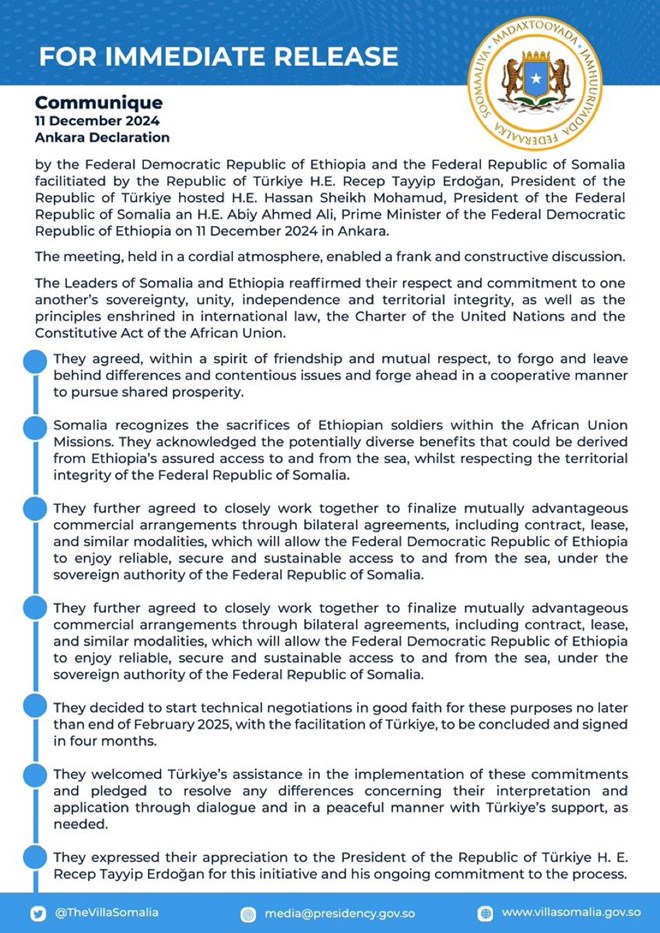
Ten Top Corruption Facts in #Somalia 2024 Government
Why did #Somalia’s Federal President His Excellency Hassan Sheikh Mohamud refused to establish the Somali Federal Constitutional Court?
- Who killed Former Somali Intelligence Colonel Ikram Tahalil?
The Former Director of the Somali National Intelligence and Security Agency (NISA) Fahad Dahir Yasin exposed publicly through this televised and recorded program publicly
2. Who planned the political assassinations?
The Former Director of the Somali National Intelligence and Security Agency (NISA) Fahad Dahir Yasin a group of people who are currently holding top ministerial and other cabinet positions within the current federal government led by President his Excellency Hassan Sheikh Mohamud
3. Who refused the Capital City of #Mogadishu and Banadir Region to have free and fair state and federal representation pr representatives?
President his Excellency Hassan Sheikh Mohamud did not like to see other parallel muscles to oppress and reject his illegal political derailments while occupying his will of supreme power control in the country.
4. Who stole the Somali National food, clothes, gas and weaponry Consignments?
President His Excellency Hassan Sheikh Mohamud knew those who have definitely stolen and covered up their crimes. Unfortunately, the International Community exposed it to the Somali people shaming the Somali Federal Government with its extreme internal corruption which they have done nothing to solve so far.
5. Who bribes the Somali Lower and Upper Houses to temper with the Somali Federal Provisional Constitution in order to extend his tenure illegally?
President His Excellency Hassan Sheikh Mohamud bribed and ordered to remove 4 chapters of the Somali Federal Provisional Constitution which he has successfully amended to his own interests while majority of the Somali people and several other semi-autonomous states rejected his illegal moves.
6. How many semi-autonomous states are not currently collaborating with the Somali Federal Government?
President His Excellency Hassan Sheikh Mohamud understood that making more chaotic and political derailments, it would be easy for him to travel and swindle money on behalf of the Federal Republic of Somalia .
7. Who hires people for Somali Federal Government jobs?
President His Excellency Hassan Sheikh Mohamud is only one who ordered to hire his own genealogical family to take key government posts while ignoring the Somali system of power-sharing which is called the 4.5 power-sharing formula.
8. Who ordered to evict poor families in #Mogadishu?
President hGs Excellency Hassan Sheikh Mohamud has ordered his corrupt lead to evict innocent people who have been living in public owned houses and properties regardless of their poor status then bid for sale to top Somali traders and ruling lead.
9. Who cannot travel or visit within the Federal Republic of #Somalia?
President his Excellency Hassan Sheikh Mohamud, two speakers, their deputies, the Prime Minister, his Deputies and the Entire Somali Lower and IUpper Houses cannot travel or visit #Hargeisa #Somaliland, #Garorwe #{Puntland and #Kismayo #Jubbaland
19. Who refused to give women’s quota in the Somali Federal Cabinet?
President his Excellency Hassan Sheikh Mohamud ignored and humiliated Somali women even when he recently decided to appoint more Intelligence Director, as the Somali Minister of Women and Family Affairs Lieutenant-General Bashir Gobe
Dear Somalis,

Saturday October 26, 2024
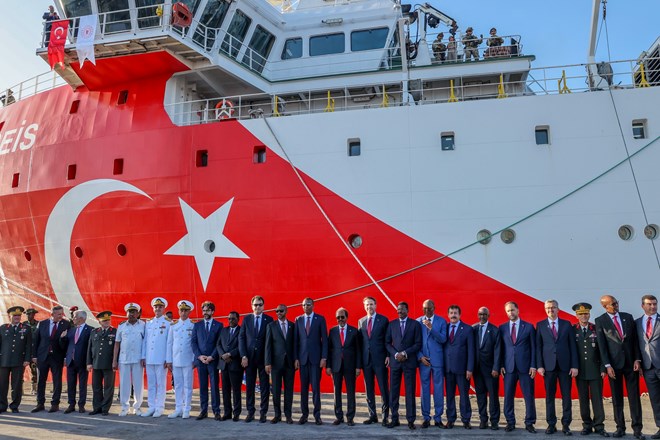
Türkiye is set to begin oil and natural gas exploration in Somali land areas thanks to a new agreement between Turkish Petroleum and Somali Petroleum Authority, Turkish energy and natural resources minister announced on Friday.
Turkish Petroleum Corporation and Somali Petroleum Authority signed a new agreement for hydrocarbon exploration in land areas, said Minister Alparslan Bayraktar, speaking at the welcoming ceremony at the Port of Mogadishu where the Oruc Reis ship arrived following a 20-day journey from Istanbul.
Türkiye and Somalia are further broadening cooperation in maritime regions, he added.
Oruc Reis will carry out three-dimensional seismic studies in areas off the coast of Somalia. The mission is expected to last approximately six months and will involve collecting seismic data for both oil and natural gas. This data will be analyzed in the Turkish capital Ankara to identify potential drilling sites.
Earlier on Friday, Bayraktar met with Somalia’s Prime Minister Hamza Abdi Barre, the Turkish minister posted on X, sharing photos from the meeting. Ties between Türkiye and Somalia ‘are getting stronger every day with the projects we jointly develop,’ Bayraktar shared on X.
‘We want to contribute to the welfare of the Somali people and strengthen our friendship by investing not only in oil and gas but also in mining and electricity sectors,’ he said.
The Turkish minister was also received by the President of Somalia, Hassan Sheikh Mohamud.
Since Turkish President Recep Tayyip Erdogan’s historic visit to Somalia in 2011, ‘our bilateral relations have gained significant momentum,’ Bayraktar said in a separate post on X. ‘Now, with the launch of our Oruc Reis ship, we are entering a new phase of partnership,’ he added.
Earlier this year, Türkiye and Somalia signed memorandums of understanding between their ministries and governments. Under these agreements, Turkish Petroleum, Türkiye’s national oil company, obtained licenses for three offshore areas in Somali waters. The ministry plans to conduct seismic surveys across the three licensed zones, each covering roughly 5,000 square kilometers.
Türkiye, a close ally of the Horn of Africa nation, has invested in the country’s education, infrastructure and health and provided extensive humanitarian aid through the years.
On Friday July 26, 2024 We, the Somali Media Empire (SME) hereby confirm that Journalist Ali Nur Salad was arrested illegally for exposing the internal corruption of the Somali Federal Government which is led by Somalia’s extremely and extraordinarily corrupt President H.E. Hassan Sheikh Mohamud and his bloodsucking #Damu-Jadiid team. Unfortunately, Somali Media Personnel in #Somalia works for the common good in public interest but the pathological leadership at the Somali Statehouse “#VillaSomalia” are either swindling money or selling public properties for personal gains.
On behalf of the Somali Media Empire (SME), we are directly requesting to the President Federal Republic of #Somalia H.E. hassan Sheikh Mohamud to stop dictatorial intimidations and illegal targeting against the Somali investigative journalists in #Mogadishu and Somalia at large .
The Somali Federal Government must comply with the Somali Federal Provisional Constitution, and it is the best time to know that Somali Media Personnel are fearless and decided to expose your internal and external corruption.
Somali Journalists Syndicate – SJSNational Union of Somali Journalists (NUSOJ)Human Rights WatchAmnesty InternationalCSIS | Center for Strategic & International StudiesChatham HouseTransparency InternationalUnited NationsAfrican UnionIGAD Secretariatجامعة الدول العربية – League of Arab StatesEuropean CommissionAqalka SareGolaha Shacabka BJFSSheikh Adan Mohamed Nur MadobeSadia Yasin SamatarHon Abdullahi Omar Abshir-AbshirowTelefishinka Qaranka SoomaaliyeedRadio MogadishuSNA RADIOUnited Nations Assistance Mission in Somalia – UNSOMOPM SomaliaVilla SomaliaHassan Sheikh MohamudSharif Sheikh AhmedMohamed Abdullahi Farmaajo

See insights and ads
Thursday July 18, 2024
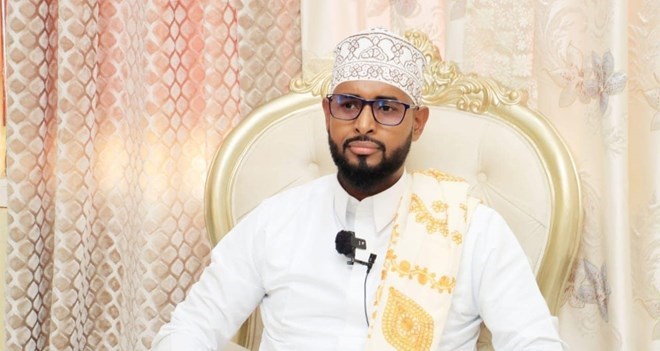
Chief Mohamed Ugaas Ahmed of the Sade clan during a recent interview discussing the Federal Government’s threats to the residents of Abudwaq. Credit: SUPPLIED
Mogadishu Clan Chief Mohamed Ugaas Ahmed, the leader of the Sade subclan within the Marehan clan, has criticized the Federal Government of Somalia for threatening the residents who confiscated illegal weapons in the Galgaduud region, calling it unfortunate.
Ugaas Ahmed stated that the Federal Government had ignored the danger averted by the residents who seized the weapons, which he claimed were intended for a brutal massacre.
He added that all Somali clans are armed, and there has been no disarmament campaign against any group.
“As is well known, an organized group dealing in illegal arms smuggled military supplies into Northern Galgaduud on July 16, 2024. These weapons, which were not reported to traditional leaders, local administrators, or the general population, were on the verge of falling into the hands of dangerous groups, threatening the security of the region, Galmudug, and the entire country,” Chief Mohamed said.
The clan leader said the security forces escorting these weapons failed to address the residents’ security concerns. Instead, according to him, they responded with a massacre that claimed 12 lives and injured 50 others.
Ugaas Ahmed called on the Federal Government to promptly take responsibility for the deaths of the residents in the Shilmado area of Abudwaq district.
Kenyan police ban protests in Nairobi CBD after deadly clashes
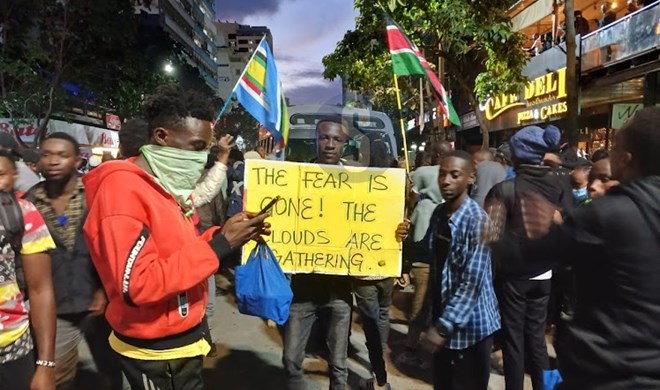
Protesters hold placards in the Nairobi CBD while demonstrating over the Finance Bill on June 20, 2024. Image: DENIS GATUMA
NAIROBI, Kenya Kenyan police have banned all protests in Nairobi’s Central Business District (CBD) following a series of violent demonstrations that have resulted in numerous casualties and significant property damage. Acting Inspector General of Police Douglas Kanja announced the ban late Wednesday, citing “credible intelligence” that organized criminal groups intended to exploit the protests for criminal activities, including looting.
The protests, initially peaceful, began last month in opposition to a proposed finance bill that included tax hikes. Although President William Ruto has since withdrawn the bill and dismissed his entire cabinet in an effort to quell the unrest, demonstrations have continued. The protests have evolved into a broader movement against corruption, poor governance, and police brutality, with many calling for Ruto’s resignation.
Since the demonstrations began on June 18, at least 50 people have been killed and over 400 injured, according to the state-funded Kenya National Commission on Human Rights. The protests, primarily organized and driven by young Kenyans using social media platforms, have seen participants clash with police forces in multiple cities, including Mombasa, Kisumu, Nakuru, and Nyeri.
Prominent demonstrator Hanifa Edan highlighted concerns about the infiltration of protests by “goons,” a sentiment echoed by many participants and observed by journalists. This infiltration has led to increased violence and disorder, further complicating the situation for both demonstrators and law enforcement.
In response to the ongoing unrest, police have deployed heavily across Nairobi, particularly around areas like Uhuru Park, where protesters had planned to gather. Officers have utilized tear gas and other measures to disperse crowds, leading to sporadic clashes and further escalating tensions.
Despite the ban, calls for protests persist online, with many young Kenyans, referred to as Generation Z, continuing to mobilize against what they see as systemic issues within the government. These youth-led protests, lacking formal leadership, have posed a unique challenge to law enforcement, complicating efforts to maintain order and ensure public safety.
The situation remains tense, with police urging the public to stay vigilant and cooperate with authorities. Several diplomatic missions in Nairobi have also issued an advisory to its citizens, warning them to stay indoors due to the anticipated demonstrations.
As Kenya braces for the next phase of this unrest, the government’s handling of the protests and the public’s response will likely have significant implications for the country’s political and social landscape.
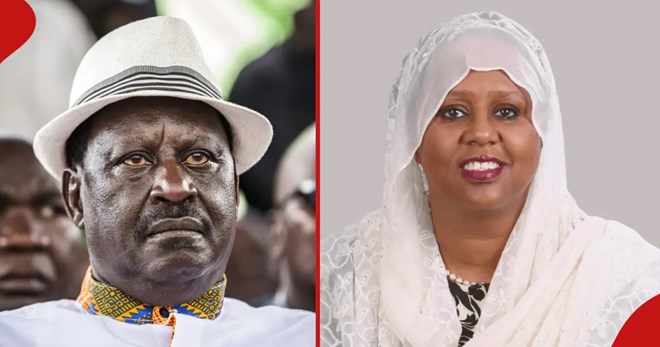
Nairobi – Azimio la Umoja One Kenya Coalition Party leader Raila Odinga has received a major setback in his bid for the African Union Commission (AUC) chairmanship position.
How many countries are in Organisation of Islamic Cooperation?
he former prime minister is facing a stiff competition from Somalia’s candidate Fawzia Yusuf Adam.
In the latest development, Somalia’s Foreign Minister, Ahmed Moalim Fiqi, has disclosed that the Organisation of Islamic Cooperation (OIC), has expressed support for Somalia’s nomination of Fawzia for the position of Chairperson of AUC for the 2025–2028 term.
Fiqi said it was a big win for Somalia, given OIC has nearly 30 African member states.
“Somalia appreciates and is grateful for the support of the Organization of Islamic Cooperation (OIC), which has nearly 30 members from Africa, for taking note and endorsing Somalia’s nomination of Fawzia Yusuf Adam for the position of AU Chairperson for 2025-2028,” Fiqi said.
If Fawzia gets the support of the 30 African Union member states, she will be ahead of other candidates, given that the AU is made up of 55 member states.
Djibouti’s Foreign Minister, Mahmoud Ali Youssouf, is also eying the same position, given it is reserved for Eastern African countries.
Why Kenya Kwanza leaders are unhappy with Raila Meanwhile, Raila’s unexpected criticism of President William Ruto’s administration attracted responses from Kenya Kwanza Alliance leaders and supporters.
Some asked the president to reconsider supporting the former prime minister in the African Union Commission chairmanship position.
What you need to know about Raila Odinga’s AU bid
- Former Nigerian president Olusegun Obasanjo endorsed ODM leader Raila Odinga as chairperson of the African Union Commission.
- Lawyer Miguna Miguna raised concerns about Raila’s eligibility for the African Union Commission position.
- Azimio La Umoja One Kenya Coalition Party leader Raila Odinga intensified lobbying and campaigns for his bid for the African Union Commission (AUC) chairman seat.

by ALLAN KISIA
Sunday April 21, 2024
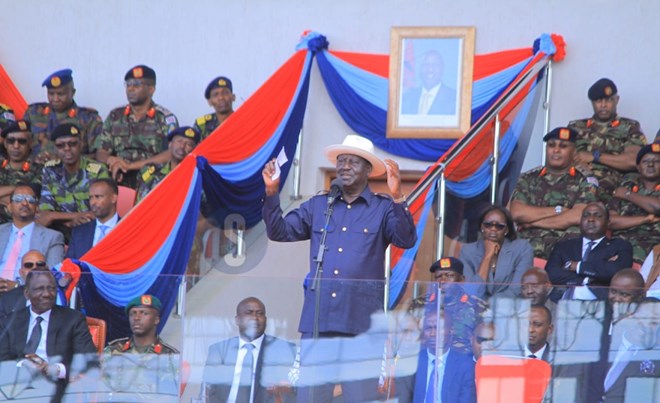
Opposition leader Raila Odinga during the memorial service of late General Francis Ogolla at Ulinzi sports complex on April 20, 2024. Image: EZEKIEL AMING’A
Opposition leader Raila Odinga has called for thorough investigations into the helicopter crash that killed Chief of Defence Forces General Francis Ogolla and nine other military officers.
Speaking at Ulinzi Sports Complex in Lang’ata, Nairobi during military honours and memorial service on Saturday, Raila said the investigations should establish why the helicopter came down.
“Because of the manner in which Ogolla died, a lot of rumours are flying all over. We want these rumours to be put to rest,” he stated.
Raila further said it was time the country took a look at the conditions of its military equipment.
“We have seen a number of these accidents over the last five to 10 years. There have been so many of these crashes,” he stated.
Ogolla was among the 10 officers who died in a helicopter crash on Thursday on the border between Elgeyo Marakwet and Uasin Gichu counties.
The military aircraft had been on a visit to troops deployed in northwest Kenya to combat cattle rustling and came down just minutes after taking off near Cheptulel Boys Secondary School in West Pokot County.
It was not immediately clear what caused the crash.
The government has already dispatched a team to probe the helicopter crash, which occurred shortly after take-off.
The investigators from Kenya Air Force and Directorate of Criminal Investigations have visited the scene of the crash to analyse the debris of the ill-fated plane.
Ogolla’s body will be flown to Ng’iya village, Alego Usonga subcounty in Siaya County on Sunday morning for burial the same day.
Two soldiers survived the crash and are in hospital.
Ogolla was previously the head of the Kenyan air force before rising to deputy military chief and then being promoted by Ruto last year to head the military.
The general joined the military in 1984 and trained as a fighter pilot with United States Air Force and as an instructor pilot at the Kenyan Air Force.
Raila also showered praises on the fallen general saying he served the country dutifully and diligently.
“By his conduct, Ogolla showed that he loved his country and was prepared to serve and die on behalf of this country. We take comfort in listening to his son talk about him and when I saw Joel talk there, I said this is a case of the general. We saw how simple the general was,” he stated.

Sunday April 21, 2024

Mogadishu (HOL) — The bodies of a man and his ex-wife were discovered in a bullet-proof vehicle parked near the National Theater in Mogadishu on Saturday, shocking residents and authorities.
According to relatives, the bodies were identified as Abukar Yusuf Ibrahim and Hamdi Abdulkadir Abdulle, who had been missing for the past three days. The circumstances surrounding their deaths remain unclear.
Ibrahim, the deceased man, was reportedly the driver of Mohamed Zubeer, the permanent secretary in the office of Prime Minister Hamse Abdi Barre.
Abdulkadir Abdulle, the father of the deceased woman, told the media that they had been searching for his daughter for three days before discovering her body alongside her ex-husband in the vehicle.
The bodies have been transported to the CID center for investigation into the reasons behind the killings. Meanwhile, the families of the deceased have demanded justice from the federal government, seeking answers and accountability for the tragic deaths.

By BONIFACE OTIENO
Monday April 8, 2024

The Office of the United States Trade Representative (USTR) says in a new report that Ifmis faces multiple risks that have been highlighted by American firms doing or seeking to do business with Kenya. PHOTO | SHUTTERSTOCK
The United States says Kenya’s Integrated Financial Management Information System (Ifmis) is vulnerable to manipulation and hacking, leading to loss of billions of shillings of taxpayer money.
The Office of the United States Trade Representative (USTR) says in a new report that Ifmis faces multiple risks that have been highlighted by American firms doing or seeking to do business with Kenya.
“US companies have expressed concerns about Ifmis due to insufficient connectivity and technical capacity in county government offices, apathy from county government officials, central control shutdowns, and security gaps that render the system vulnerable to manipulation and hacking,” US Trade Representative Katherine Tai said in the report.
A review by USTR notes that Kenya is neither a party to the WTO (World Trade Organisation) Agreement on Government Procurement nor an observer to the WTO Committee on Government Procurement.
Ifmis was created to provide audit trails of all financial transactions with details of the person who logged in, the time, the computer used and the action performed in efforts to end graft.
It is the technological tool through which the government monitors the national finances, from planning through budgeting to procurement, payment, accounting and reporting.
However, it has been at the centre of corruption claims in some of the largest elaborate theft syndicates and graft exposés to hit Kenya both at the national and county government levels over the years leading to questions over its efficacy at guaranteeing accountability.
In 2016, senior officials of an agency under the Ministry of Health tried to steal Ksh30 million by manipulating Ifmis in a case that lifted the lid on an elaborate theft syndicate that involved corrupt government officials and crooked suppliers.
The attempted theft in May 2016 was detected and stopped at the last minute as accountants at Afya House prepared payments for alleged suppliers by six companies.
The case demonstrated how fraudsters working with wayward officials have managed to siphon billions of shillings from state coffers using dubious suppliers’ contracts.

Monday April 8, 2024
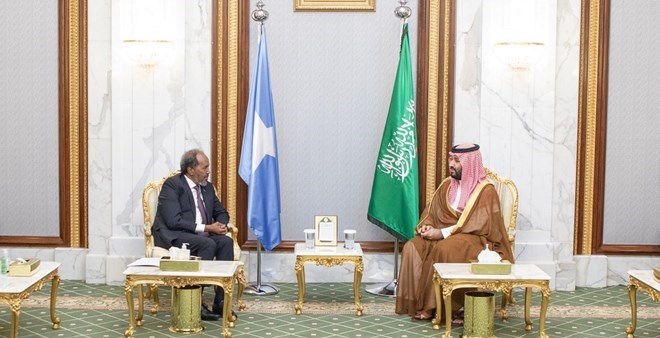
A joint statement was issued today at the conclusion of the visit of the Federal Republic of Somalia President Hassan Sheikh Mohamud to the Kingdom of Saudi Arabia, reading as follows:
At the invitation of Custodian of the Two Holy Mosques King Salman bin Abdulaziz Al-Saud, and based on the distinguished relations between the two countries and their brotherly peoples, President of the Federal Republic of Somalia Hassan Sheikh Mahmoud came on an official visit to the Kingdom on April 6, 2024.
His Royal Highness Prince Mohammed bin Salman bin Abdulaziz Al-Saud, Crown Prince and Prime Minister, received the president at Al-Safa Palace in Makkah, where they reviewed bilateral relations and ways to develop them, and exchanged views on current regional and international developments.
The two sides stressed the need to continue joint work in the economic, trade and investment fields, to develop and diversify the volume of trade, and to intensify visits by officials and private sector representatives from both countries. Remarkably, the volume of trade between the two countries witnessed a 105% year-on-year growth from 2021 to 2022.
Recognizing the opportunities presented by Saudi Arabia’s Vision 2030, the two parties agreed on the need to boost investment in the agricultural, livestock, fisheries, transportation, logistics services, and ports.
They welcomed the results of the Saudi-Somali round table, which was held on the sidelines of the Saudi-African summit, attended by the Somali president.
The two sides also stressed the importance of maintaining stability in global energy markets.
Somalia commended the Kingdom’s role in maintaining a balanced global oil market, which benefits both producer and consumer nations, and fosters sustainable economic growth.
Discussions on climate change highlighted the shared commitment to comply with the Framework Convention on Climate Change and the Paris Agreement. The two parties emphasized the need to produce and implement climate action plans that prioritize reduction of emissions.
The Somali side expressed its appreciation for the Kingdom’s pioneering Saudi Green Initiative and Middle East Green Initiative, and pledged its support for Saudi Arabia’s endeavors to combat climate change.
The two sides agreed to strengthen cooperation across a broad spectrum of areas, such as: electricity, renewable energy, and energy efficiency; supplying petroleum derivatives, petrochemicals agricultural nutrients, and examining opportunities for innovative uses of hydrocarbons; agriculture and food security, and private sector investment and trade partnerships in the field of agricultural and food industries; communications, technology, digital economy, innovation, and space; judiciary and justice; air transport, ports, logistics and civil aviation; culture; sports; social development; education; media; geological survey and mining.
The two sides discussed increasing military and security cooperation to achieve common goals. They agreed to strengthen collaboration in combating all forms of crime, including smuggling, terrorism and financing terrorism. They committed to sharing information to neutralize threats from terrorism and extremism, and to promote moderation and tolerance.
Furthermore, the two parties affirmed their unwavering resolve to heighten the level of coordination and cooperation in combating cross-border crimes in all their manifestations. Such commitment entails collaborating to prosecute perpetrators, recover proceeds accrued through illicit activities, and leverage the expertise and resources of the Global Operation Network of Anti-Corruption Law Enforcement Authorities (GlobE Network). Moreover, the exchange of experience and specialized training will be pursued, ultimately contributing to the strengthening of the security and stability of the two brotherly nations.
The Kingdom welcomed the reforms achieved by Somalia under the leadership of President Hassan Sheikh Mohamud, and the restoration of security and stability in many Somali regions. Saudi Arabia praised the progress achieved by Somali forces against terrorist organizations, and expressed the need for the international community to support Somali efforts to eliminate terrorism.
The Kingdom also welcomed the UN Security Council’s decision to lift the arms embargo on Somalia, which opens the way for building Somali security forces who can thus assume security responsibilities after the withdrawal of African Union forces.
The Kingdom welcomed the international creditors’ decision to approve debt forgiveness for Somalia, due to the success of Somalia’s efforts to implement economic reforms to achieve sustainable development, gaining credibility for its financial institutions.
Regarding the memorandum of understanding that Ethiopia signed with the Somali region (Somaliland), the Kingdom voiced its great concern for the unity of the Federal Republic of Somalia and its sovereignty over its entire territory. The two sides affirmed their adherence to the Arab League decision, dated January 17, 2024, which affirmed support for the security, stability, unity, sovereignty, and territorial integrity of Somalia.
The two sides also stressed the need to adhere to the principles of good neighborliness, behave wisely to spare the region the risk of tension and conflicts, and do the utmost to preserve the security and stability of the region, and enhance cooperation and integration among the countries of the region.
Regarding regional issues, the two sides discussed developments in Palestine, and expressed deep concern about the humanitarian catastrophe in Gaza Strip and the brutal war the strip has been witnessing, and about the death of tens of thousands of unarmed civilians killed by deliberate attacks by the Israeli occupation forces.
They stressed the need to stop military operations in the Palestinian territories, protect civilians and enable international humanitarian organizations to carry out their task of providing humanitarian aid. They also stressed that the international community must play a role in putting an end to Israeli violations.
The two sides welcomed the UN Security Council resolution regarding a ceasefire in Gaza during Ramadan, and stressed the need to intensify efforts to reach a comprehensive and just settlement to the Palestinian issue in accordance with the principle of the two-state solution, the Arab Peace Initiative, and the relevant international resolutions, in a way that guarantees the Palestinian people their right to establish an independent state on the 1967 borders, with East Jerusalem as its capital.
In regard to Yemen, the two sides stressed the importance of lending full support to international and regional efforts to reach a comprehensive political solution to the Yemeni crisis.
The Somali side praised the Kingdom’s efforts and its many initiatives aimed at encouraging dialogue and reconciliation between the Yemeni parties, as well as its role in providing and facilitating the arrival of humanitarian aid to all regions of Yemen.
The two sides said that it is important to maintain the security and stability of the Red Sea region, stressing that freedom of navigation is an international requirement right that works in the interest of the entire world, and called for restraint and to avoid escalation in the context of the events taking place in the region.
Regarding the Sudanese issue, the two sides stressed that the two parties to the conflict should end the conflict between them. They welcomed the outcome of the Jeddah talks (2) on November 7, 2023, which was a commitment to take steps to facilitate the increase in humanitarian aid and implement confidence-building measures in preparation for reaching a permanent cessation of hostilities, and to alleviate the suffering of the Sudanese people.
At the conclusion of the visit, the Somali president thanked and expressed appreciation to the Custodian of the Two Holy Mosques and His Royal Highness the Crown Prince and Prime Minister for the good reception and hospitality shown to him and his accompanying delegation.
HRH the Crown Prince expressed his best wishes to the Somali president, and wished further progress and prosperity to the brotherly Somali people.
Saturday March 30, 2024
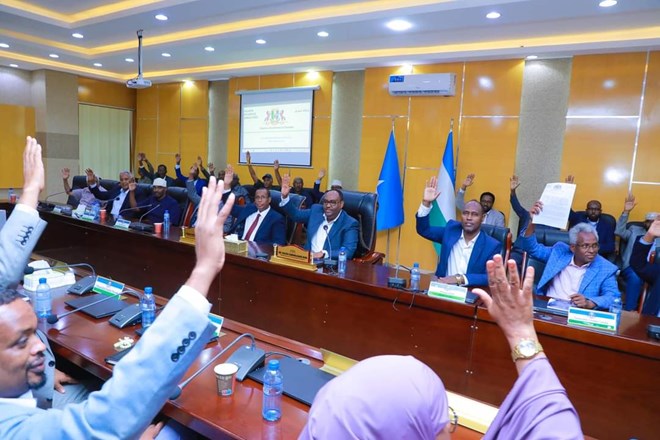
Puntland lawmakers cast their votes on a decisive motion to withdraw recognition of the Federal Government of Somalia, amid deepening constitutional disputes and calls for regional autonomy.
Mogadishu (HOL) – Puntland’s regional administration announced on Sunday its decision to withdraw recognition of the Federal Government of Somalia, citing recent constitutional amendments as a breach of the federal pact that has historically united the country. The declaration from Puntland’s capital, Garowe, follows changes to Somalia’s constitution, approved by the Somali Federal Parliament, which have sparked political turmoil and concerns over national unity.
The crux of Puntland’s grievance lies in the Federal Government’s repeal of the 2012 Provisional Constitution and adoption of new laws that Puntland argues favour particular interests and threaten the federal structure. Puntland’s government has repeatedly warned that such unilateral actions by the Federal Government jeopardize the country’s unity and governance. The regional administration asserts that these changes violate the foundational agreements of Somalia’s federal system, as outlined in the Transitional Federal Constitution and the Puntland State Constitution.
Puntland claims its stance is backed by constitutional provisions, including Article 142 of the Transitional Federal Constitution, which preserves the powers of pre-existing administrations until a harmonization of constitutions is achieved. Article 4 of the Puntland Constitution also empowers the region to reconsider its integration with the Federal Central Government, especially if the federal system is compromised.
The background to this crisis is Somalia’s historic constitutional amendments, which have been a point of contention among various political stakeholders. The amendments, which alter the power dynamics between the president and the prime minister and introduce a multi-party system, have been perceived by Puntland and other critics as a move that could destabilize Somalia’s federal arrangement. The changes, notably the increased powers of the president, have raised fears of a centralized authority undermining the autonomy of federal states like Puntland.
The amendments were part of a broader constitutional review aimed at addressing issues such as women’s representation and freedom of expression, but they have inadvertently exacerbated a political divide. Despite the perceived lack of consensus among Somalia’s federal states, Puntland’s decision to withdraw recognition of the Federal Government was primarily motivated by the decision to implement these amendments.
In response, Puntland has declared its intent to operate independently until Somalia establishes a more inclusive and representative constitutional framework.
Before Saturday’s Somali Parliament vote, former presidents, prominent politicians, and Puntland State leaders strongly opposed President Mohamud’s efforts to amend and review the constitution.
—
TRANSLATED PRESS RELEASE:
PUNTLAND GOVERNMENT DECISION
GAROWE, March 31, 2024
Today, March 31, 2024, an extraordinary meeting was held in Garowe, the capital of Puntland Government. The meeting was held on the action taken yesterday, March 30, 2024, by the Federal Government Councils to repeal the Constitution approved in Mogadishu in 2012, instead of this, the approved laws were enacted with a new constitution that has vested interests. The Puntland government has warned many times that if it is taken, it will harm the unity, government and unity of the Somali nation. The Puntland government believes that the decision of the Federal Councils yesterday has annulled the laws and agreements that protected the unity of the country based on the Federal system.
The Puntland government, based on it
1. Article 142 of the Transitional Federal Constitution, which states “until the time when all the constitutions of the member states of the Federal Government are harmonized with the Constitution of the Federal Government, the Administrations that existed before the adoption of the Temporary Constitution, retain the powers conferred by their constitutions”,
2. Article 4 of the Constitution of the Puntland Government, paragraph 4, letters (b) and (t), which states “The Puntland Government is entitled to reconsider its integration with the Federal Central Government, if the Somalis They do not agree on a government structure that is not lower than the federal system, and prolong the instability and wars that are happening in other parts of Somalia.
3. Also referring to and implementing the decisions that came out of the general consultation conference of Puntland held in Garowe on March 17, 2020, Article 10 which was decided to
The government of Puntland can take any decision to save the fate and future of its nation that the Federal Constitution and Puntland allow and represent its people.
Therefore, the Puntland Government has reached the following decisions:
1) The Puntland government has lost the recognition and trust of the Federal Government agencies until a comprehensive constitutional system is found in Somalia, which Puntland is a part of.
2) According to the Puntland Constitution Article 4, Paragraph 3, the Puntland Government will have the power of a complete and independent government as long as there is a federal system of government, with an agreement, with a Somali constitution that is agreed upon, and a public referendum. which Puntland is a part of.
the base
3) In accordance with the basic article of the Constitution of the Federal Government of Somalia, Chapter 1, Article 1, Paragraph 1 and Paragraph 2 of the Basic Principles, written as follows: the people who claim the independence of the federal republic of somalia or use the constitution specifically” so Hassan sheikh Mohamud canceled the constitution that was agreed upon and he was elected and sworn in. So, Hassan Sheikh Mohamud has lost the constitutional rights of the Presidency.
4) The Puntland government welcomes and cooperates with anyone who recognizes and practices the constitution of the agreement that was approved on August 1, 2012.
5) The Puntland government negotiates directly with the international community and international organizations on issues related to its interests.
6) This decision passed by the Government Council is presented to the House of Representatives of the Puntland Government.
ORIGINAL PRESS RELEASE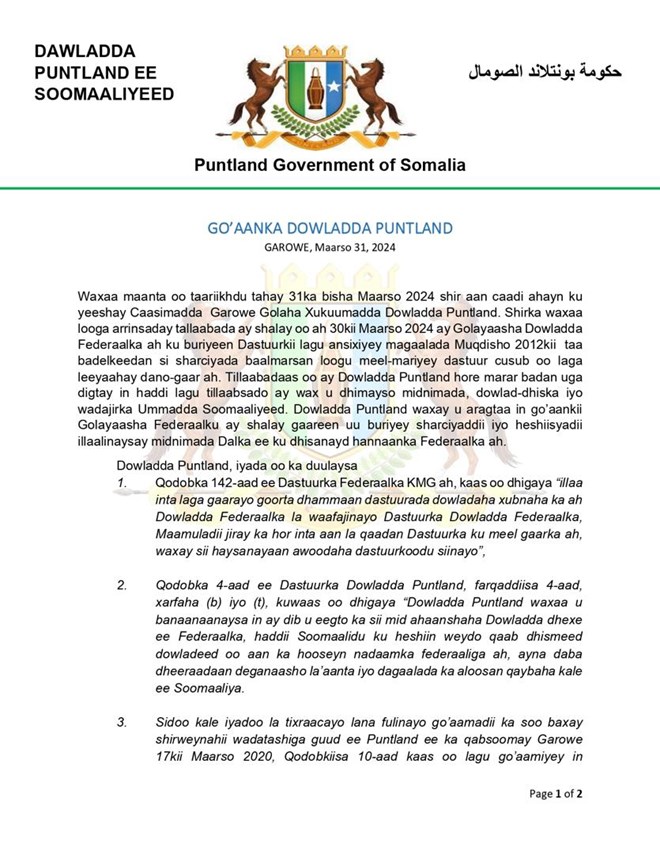
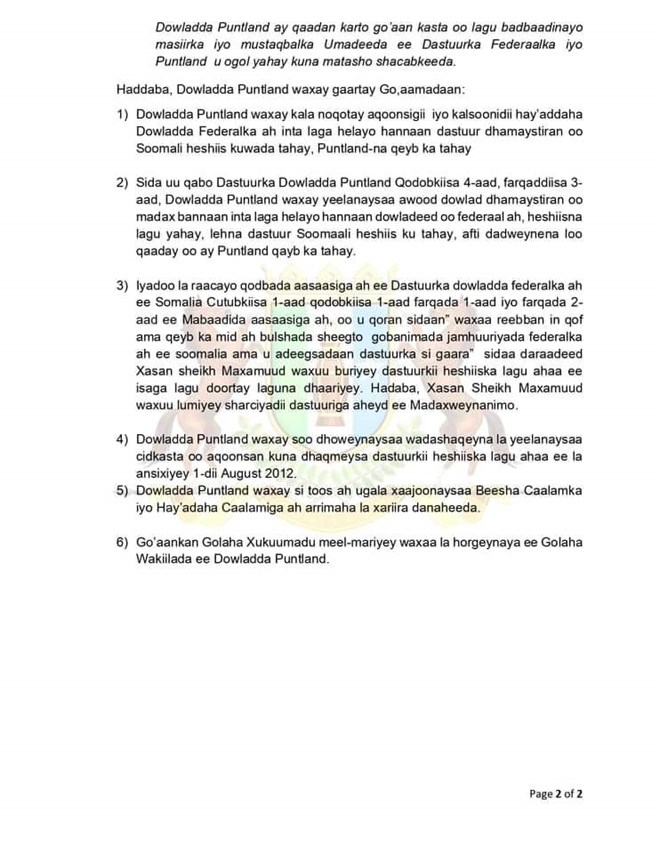
Saturday March 30, 2024
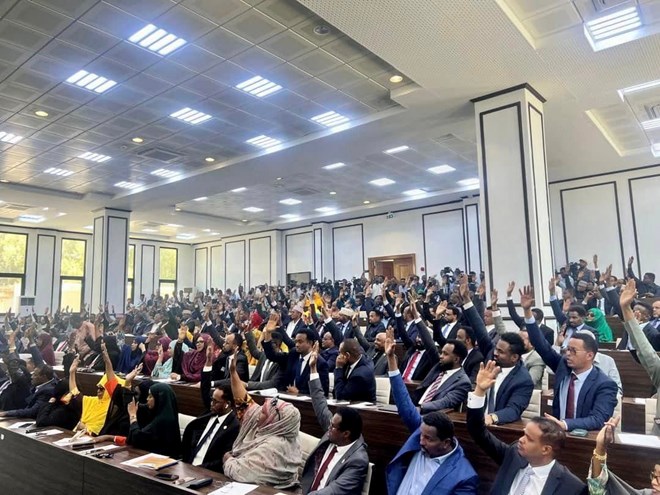
Mogadishu (HOL) – Somalia’s bicameral federal Parliament approved the amendment of the first four chapters of the country’s provisional Constitution on Saturday following several weeks of heated debates in the Parliament.
The lawmakers voted on the four chapters one by one before casting their votes for the overall amendments of the Constitution proposed by the Independent Constitutional Review and Implementation Commission.
Saturday March 30, 2024

Mogadishu (HOL) – Somalia’s bicameral federal Parliament approved the amendment of the first four chapters of the country’s provisional Constitution on Saturday following several weeks of heated debates in the Parliament.
The lawmakers voted on the four chapters one by one before casting their votes for the overall amendments of the Constitution proposed by the Independent Constitutional Review and Implementation Commission.
Puntland March 24, 2024 #BreakingNews Former #Somali #Presidents, #PrimeMinisters & Majority of the Lower &Upper Houses #MPS rejected the illegal amendment of the #Somalia #Constitution which current President H.E. Hassan want to extend his #tenure
@UN @UNSomalia @AP @nytimes @BBCWorld @RT_com @dwnews

Thursday March 14, 2024
‘When you come home, we’re going to arrest you’, South Africa’s foreign minister tells Israeli soldiers
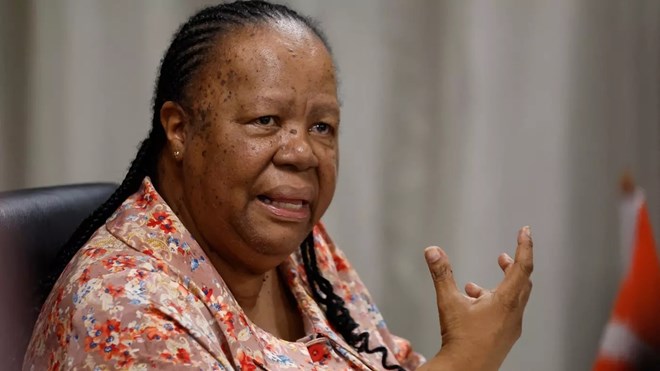
Naledi Pandor, South Africa’s foreign minister, in Pretoria on 5 March 2024 (AFP)
South Africa’s Minister of International Relations and Cooperation Naledi Pandor said that nationals who have served in the Israeli army will be prosecuted upon re-entering the country, as Israel continues its devastating war on the Gaza Strip for the sixth month.
“I’ve already issued a statement alerting those who are South African and who are fighting alongside or in the Israeli Defense Force. We are ready. When you come home, we’re going to arrest you,” Pandor said during an African National Congress meeting earlier this week.
In her speech restating her country’s solidarity with Palestine, the South African minister referred to her earlier statements in December, in which she warned South African citizens who serve in the Israeli army could be brought to justice.
According to the Israeli Security Service law, all citizens, including dual nationals, are obliged to enlist in the military even if they permanently reside abroad.
After the war broke out in Gaza on 7 October, the Israeli army called upon reserve soldiers, including those living abroad, to join the fighting.
On 18 December, the South African foreign ministry issued a statement requesting all nationals to “avoid joining foreign armed forces which may contribute to the violation of domestic and international law”. Otherwise, they would be “liable for prosecution in South Africa”.
The December statement said South Africa was “gravely concerned by reports that some South African citizens and permanent residents have joined or are considering joining the IDF in the war in Gaza and in the other Occupied Palestinian Territories”.
It added that naturalised citizens of South Africa could be stripped of their citizenship.
‘We will not condone genocide’
This warning was not the first of its kind.
In November a South African minister in the presidency, Khumbudzo Ntshavheni, said that her country’s laws do not allow citizens to fight under the flags of other countries.
Her statements came as a response to a parliamentary question about what action South Africa is taking against citizens fighting alongside the Israeli army.
South Africa has been among the staunchest opponents of the Israeli war on Gaza, and has led a case before the International Court of Justice (ICJ) accusing Israel of committing genocide against the Palestinians in the besieged enclave, and requesting provisional measures to end the war.
On 26 January the ICJ issued provisional measures, calling on Israel to refrain from impeding the delivery of aid into Gaza and improve the humanitarian situation. It also ordered Israel to take all measures within its power to prevent acts of genocide in the besieged enclave and to punish incitement to genocide.
Israel’s ongoing onslaught on the Gaza Strip has killed over 31,000 Palestinians. It was launched in the aftermath of a Hamas-led attack on southern Israel on 7 October, which killed 1,139 people.
South African Deputy President Paul Mashatile said on Tuesday that his country has no regrets about filing the case with the ICJ.
“Over 70,000 have been injured, while 10,000 are missing under rubble. This brings the number of civilian casualties to about 110,000, amounting to roughly five percent of Gaza’s 2.3 million population. We will not condone genocide,” he told MPs.

By Harun Maruf
Friday March 8, 2024
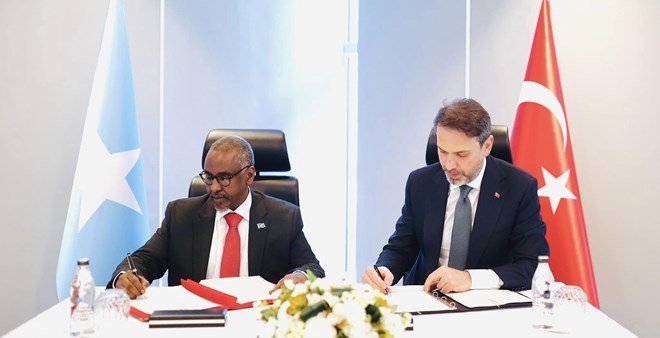
Somalia and Turkey have announced the signing of a deal to explore for oil and gas that further strengthens cooperation between the two countries, according to officials from both countries.
Under the agreement signed Thursday in Turkey, the deal is to promote the development of bilateral, scientific, technical and commercial cooperation between Turkey and Somalia in developing the oil and gas of Somalia, according to Somali Petroleum and Mineral Resources Minister Abdirizak Mohamed.
Mohamed said Turkey will explore for oil and gas in Somalia, both onshore and offshore.
“The Turkish will do the exploration, appraisal and development and production of petroleum from onshore and offshore blocks of the Federal Republic of Somalia as well as distribution, and maybe a refinery sale of petroleum and its product and service operations related to these projects,” Mohamed told VOA Somali.
“So, it’s very comprehensive though we haven’t signed the PSA [production-sharing agreement] yet.”
Mohamed said the deal is one of the protocols of the Defense and Economic Cooperation Framework Agreement reached by the two countries last month.
Under that agreement, which will last for 10 years, Turkey will build, train and equip the Somali navy, according to Somali Prime Minister Hamza Abdi Barre.
Mohamed said a follow-up agreement will contain details of the production-sharing agreement, as well as the timeline for the deal.
Turkish Energy and Natural Resources Minister Alparslan Bayraktar also welcomed the agreement.
“We signed an intergovernmental agreement and memorandum of understanding with Mr. Abdirizak Omar Mohamed, Minister of Petroleum and Mineral Resources of Somalia, to enhance our cooperation in the field of oil and natural gas in Somalia’s onshore and offshore blocks,” he posted on X. formerly known as Twitter.
“With this agreement, we will carry out joint activities to bring the resources of Somalia to the Somali people. We aim to strengthen Turkey’s presence in the Horn of Africa with new collaborations in the field of energy.”
Turkey has been a major partner of Somalia since 2011 when then-Prime Minister Recep Tayyip Erdogan visited Somalia at the height of a deadly famine. Since then, Turkey has been helping Somalia with humanitarian assistance and budgetary support.
In September 2017, Turkey opened a large military facility to train Somali security forces. The newest group graduated from the facility Thursday.
“Turkey is one of our allies, it’s one of our friends, they have been in Somalia at a time when every other country has neglected and has not given any support,” Mohamed said. “So this agreement only deepens and enhances the deep relationship between the two countries.”

Friday March 8, 2024
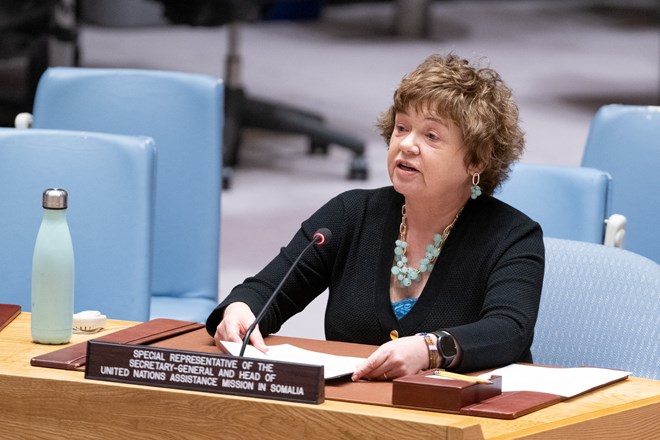
On the occasion of International Women’s Day, the United Nations today called on the Somali authorities to invest greater effort in ensuring women’s inclusion in politics and making the minimum 30 per cent quota for women’s parliamentary representation a reality.
“The minimum 30 per cent quota will go a long to helping promote gender equality and women’s empowerment in Somalia. Despite numerous challenges, Somali women continue to make significant contributions to peacebuilding and reconciliation – this is through service as Members of Parliament, on civil society organisations and on youth associations, to name a few – but there needs to be even more investment of resources to build on this progress as investing in women is a cornerstone for building inclusive societies,” said the UN Secretary-General’s Special Representative for Somalia, Catriona Laing.
“Somali women continue to remind stakeholders that ensuring inclusion and the 30 per cent quota in legislation is an achievable request given commitments already made by Somali leadership in the past,” she added.
Somali women leaders have been engaging stakeholders – including the National Consultative Council, religious and traditional leaders, the Speakers of Parliament, the Independent Constitutional Review Commission and the Oversight Committee – on the need for legislation and mechanisms to implement and achieve the women’s quota.
In Somalia, the UN supports the Federal Government in its efforts to increase women’s political participation and enact laws that strengthen the protection of women and girls, that comply with Somalia’s human rights obligations and meet international human rights standards. The UN also partners with the Federal Government and civil society to end harmful practices such as female genital mutilation.
The theme for this year’s International Women’s Day is ‘Invest in Women: Accelerate Progress.’ The occasion has been observed around the world since 1875 to celebrate the social, economic, cultural and political achievements of women, as well as to mark a call to action for accelerating gender equality.

Thursday March 7, 2024
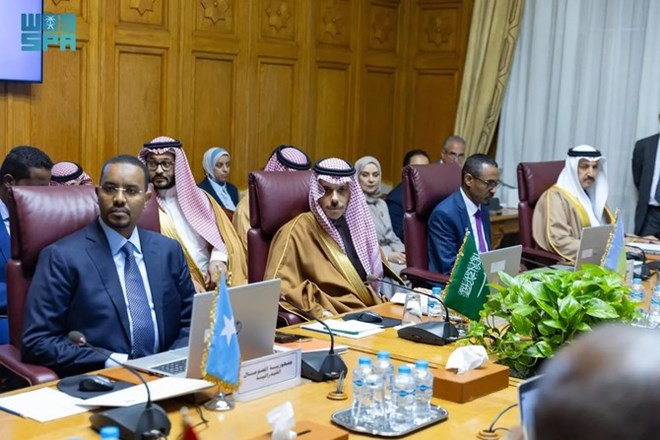
Saudi FM Prince Faisal bin Farhan in a meeting of the Ministerial Working Group on supporting Somalia in safeguarding its sovereignty and territorial integrity. (SPA)
RIYADH: Saudi Minister of Foreign Affairs Prince Faisal bin Farhan participated on Wednesday in a meeting of the Ministerial Working Group on supporting Somalia in safeguarding its sovereignty and territorial integrity, Saudi Press Agency reported.
The meeting was chaired by Somalia’s Acting Foreign Minister Ali Mohamed Omar.
Prince Faisal also recently participated in the meeting of the Arab Ministerial Committee concerned with monitoring Turkish interventions in the internal affairs of Arab countries.
The meeting was chaired by Egyptian Foreign Minister Sameh Shoukry and held on the sidelines of the 161st session of the Arab League Council in Cairo
Both meetings underscored the necessity of enhancing Arab collaboration on mutual concerns and upholding the sovereignty of member states, in line with international laws and conventions.They also tackled the latest regional and international developments and the efforts made in this regard.

BY JON GAMBRELL
Tuesday March 5, 2024
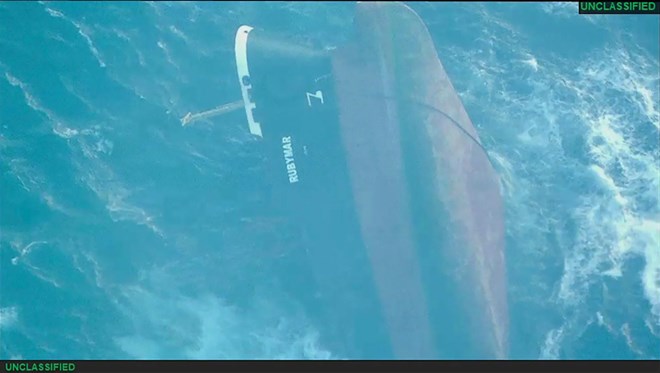
DUBAI, United Arab Emirates (AP) — Three cables under the Red Sea that provide global internet and telecommunications have been cut as the waterway remains a target of Yemen’s Houthi rebels, officials said Monday. Meanwhile, a Houthi missile attack set a ship ablaze in the Gulf of Aden, but caused no injuries.
What cut the lines remains unclear. There has been concern about the cables being targeted in the Houthi campaign, which the rebels describe as an effort to pressure Israel to end its war on Hamas in the Gaza Strip. The Houthis have denied attacking the lines, however.
While global shipping has already been disrupted through the Red Sea, a crucial route for cargo and energy shipments from Asia and the Middle East to Europe, the sabotage of telecommunication lines could further escalate the monthslong crisis.
The cut lines include Asia-Africa-Europe 1, the Europe India Gateway, Seacom and TGN-Gulf, Hong Kong-based HGC Global Communications said. It described the cuts as affecting 25% of the traffic flowing through the Red Sea. It described the Red Sea route as crucial for data moving from Asia to Europe and said it had begun rerouting traffic.
HGC Global Communications described the Seacom-TGN-Gulf line as being two separate cables when it is actually one at the area of the cut, according to Tim Stronge, a subsea cable expert with TeleGeography, a Washington-based telecommunications market research company.
Responding to questions from The Associated Press, Seacom said that “initial testing indicates the affected segment lies within Yemeni maritime jurisdictions in the Southern Red Sea.” It said it was rerouting the traffic that it was able to change, though some services were down.
Tata Communications, part of the Indian conglomerate and behind the Seacom-TGN-Gulf line, told AP that it “initiated immediate and appropriate remedial actions” after the line was cut.
“We invest in various cable consortiums to increase our diversity and hence in such situations of a cable cut or snag, we are able to automatically reroute our services,” Tata said.
Other firms behind those lines, which provide data to Africa, Asia and the Middle East, didn’t respond to AP’s queries.
In early February, Yemen’s internationally recognized government in exile alleged that the Houthis planned to attack the cables. The lines appeared to have been cut on Feb. 24, with the organization NetBlocks noticing internet access in the East African nation of Djibouti suffering from interruptions two days later. Seacom serves Djibouti.
But for their part, the Houthis have denied targeting the cables. The rebels blamed the disruptions on British and U.S. military operations, but didn’t offer evidence to support the allegation and have made false claims in the past.
Since November, the rebels have repeatedly targeted ships in the Red Sea and surrounding waters over the Israel-Hamas war. Those vessels have included at least one with cargo bound for Iran, the Houthis’ main benefactor, and an aid ship later bound for Houthi-controlled territory.
Despite more than a month and a half of U.S.-led airstrikes, Houthi rebels have remained capable of launching significant attacks. They include the attack last month on a cargo ship carrying fertilizer, the Rubymar, which sank on Saturday after drifting for several days, and the downing of an American drone worth tens of millions of dollars.
The Houthis insist their attacks will continue until Israel stops its combat operations in the Gaza Strip, which have enraged the wider Arab world and seen the Houthis gain international recognition.
Meanwhile, the British military’s United Kingdom Maritime Trade Operations center on Monday separately warned of a new attack in the Gulf of Aden. The private security firm Ambrey described the vessel targeted as a Liberia-flagged, Israel-affiliated container ship that sustained damage and issued a distress call.
“The container ship reportedly encountered two explosions of which the first occurred at a ‘distance’ off its port quarter, while the second damaged the vessel’s accommodation block and a container leading,” Ambrey said. “The explosion further led to a fire onboard and the crew’s firefighting efforts were underway.”
Ambrey and the UKMTO said no crew member on the ship had been injured in the blaze, which was extinguished several hours later.
Brig. Gen. Yahya Saree, a Houthi military spokesman, claimed the attack in a prerecorded statement. He identified the ship as the MSC Sky II, sailing for the Switzerland-based firm Mediterranean Shipping Co, but sought to link the vessel to Israel. The ship’s details and last-known location corresponded to details about the attack.
The Houthis “will continue to prevent Israeli navigation or those heading to the ports of occupied Palestine until the aggression is stopped and the siege on the Palestinian people in the Gaza Strip is lifted,” Saree said.
The U.S. military’s Central Command acknowledged the attack on the MSC Sky II and said the vessel “did not request assistance and continued on its way.” The U.S. military separately conducted airstrikes on two anti-ship cruise missiles in Yemen.
MSC didn’t respond to questions about the attack.
It remains unclear how the Houthis could attack subsea cables themselves. The rebels aren’t known to have the diving or salvage capability to target the lines, which sit hundreds of meters below the surface of the waterway.
However, subsea cables can be cut by anchors, including those dropped from some of the ships that have been disabled in attacks. A drifting ship with its anchor scraping the sea could be the culprit.
“Our team thinks it is plausible that it could have been affected by anchor dragging, due to the amount of marine traffic the region deals with and the low seabed in many parts of the Red Sea,” Seacom said. “This can only be confirmed once the repair ship is on site.”
There are 14 cables now running through the Red Sea, with another six planned, said Stronge, the subsea cable expert.
“We estimate that over 90% of communications between Europe and Asia traverse submarine cables in the Red Sea,” he said. “Fortunately, telecom operators have built a high degree of redundancy into the system — there are many cables traversing the Red Sea.”
The Houthis later warned any cable-laying ship entering Yemeni waters needed a permit from the rebels “out of concern for its safety.”

Esra Tekin
Sunday March 3, 2024
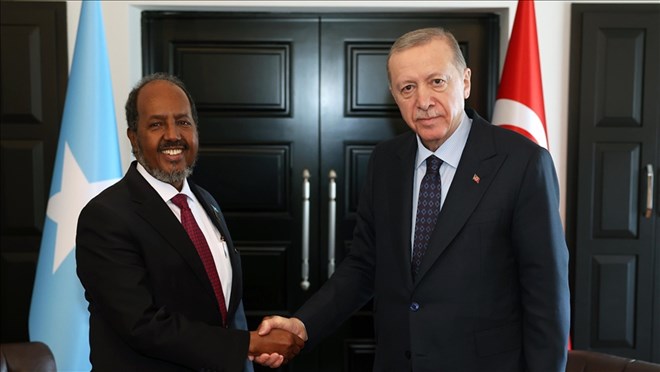
Türkiye’s President Recep Tayyip Erdogan and his Somalian counterpart Hassan Sheikh Mohamud on Saturday discussed Israeli “massacres” in the Palestinian territory, humanitarian aid, and bilateral relations.
“The meeting addressed Türkiye-Somalia relations, Israel’s massacres in the Palestinian territory as well as humanitarian aid, the fight against terrorism and regional and global issues,” the country’s Communications Directorate said on X.
The two presidents met on the sidelines of the Antalya Diplomacy Forum.
In the meeting, President Erdogan affirmed Ankara’s ongoing commitment to supporting Somalia across various domains, with a specific emphasis on defense.
In addition, Erdogan expressed Türkiye’s readiness to engage in any mediation efforts to address the tensions between Somalia and Ethiopia.
“Stating that Israel’s reckless attacks on Palestinian land must end, President Erdogan added that the foundation of lasting peace must be built on the basis of the establishment of an independent Palestinian state, based on the 1967 borders,” the directorate added.
Türkiye’s National Defense Minister Yasar Guler, the country’s National Intelligence Organization’s head Ibrahim Kalin and the president’s chief advisor Akif Cagatay Kilic also attended the meeting.

By BRUHAN MAKON
Thursday February 29, 2024
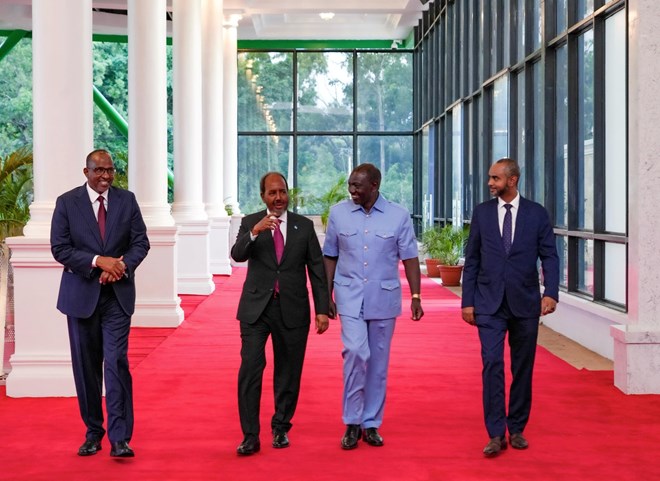
Somalia’s President Hassan Sheikh Mohamud has vowed to address critical issues on regional peace, stability, and development during his upcoming visit to Nairobi.
The East African State faces significant security challenges, primarily from the Al-Qaeda-linked terrorist group Al-Shabaab, while tensions with Ethiopia have escalated over a port access agreement involving Somaliland.
Villa Somalia said that President Mohamud, who will arrive in Nairobi Wednesday to join other world leaders in the ongoing sixth session of the United Nations Environment Assembly (UNEA-6), will touch on ”certain destabilizing unilateral actions that threaten to exacerbate the worsening situation.”
Mohamud’s visit, although unofficial, will be coming hot on the heels of Ethiopia Prime Minister Abiy Ahmed’s State Visit.
Mogadishu and Addis Ababa have been locked in a tiff since January after Somaliland, a breakaway region of Somalia, signed a Memorandum of Understanding with PM Abiy’s administration allowing Ethiopia access to the Red Sea via Somaliland’s Berbera port for 50 years.
The deal signed between Abiy and Somaliland President Muse Bihi Abdi in Addis Ababa, allows Ethiopia to build a naval base and access Somaliland’s coastline for military and commercial purposes.
In return, Ethiopia agreed to formally recognize the Republic of Somaliland, which declared its independence from Somalia in 1991.
The development saw Ethiopia become the first country to formally recognize Somaliland. Addis Ababa promised Hargeisa a share of the state-owned Ethiopian Airlines.
The decision angered Somalia, which considers Somaliland part of its territory, labeling the deal “illegitimate” and “an act of aggression”. Mogadishu said the deal violates its sovereignty and recalled its ambassador to Addis in protest.
International campaign
On January 6, President Mohamud announced that he had nullified the agreement between Ethiopia and Somaliland.
Mohamud said he signed into law legislation passed by the two Houses of Parliament voiding the “illegal Memorandum of Understanding.”
“With the support of our lawmakers and our people, this law is an illustration of our commitment to safeguard our unity, sovereignty, and territorial integrity as per international law,” Mohamud said.
Despite the call from the African Union and other international actors for the two sides to peacefully resolve the matter, Ethiopia has continued to engage other partners concerning the deal.
On Tuesday, Ethiopia’s Ambassador to Pakistan Jemal Beker met with Pakistan’s Chief of the Naval Staff Admiral Naveed Ashraf at his office where they “had a productive discussion on matters of mutual interest including maritime cooperation.”
Ambassador Beker said that he had briefed the Pakistan Naval chief on the MoU with Somaliland adding that they discussion also featured fostering regional integration and cooperation on diverse areas.
On Wednesday, Somaliland’s Ministry of Foreign Affairs briefed foreign and international missions in Hargeisa on the progress of the Somaliland-Ethiopia MoU deal and the recent killings of Somalilanders in Somalia.
Additionally, Somaliland raised objections to the ten-year defense pact between Turkey and Somalia, aimed at enhancing Somalia’s naval capabilities and coastal defense.
Somaliland also raised objections to the ten-year defense pact between Turkey and Somalia signed last week, a deal that will see Turkey help defend Somalia’s coastline and also rebuild its naval forces.

Wednesday February 28, 2024
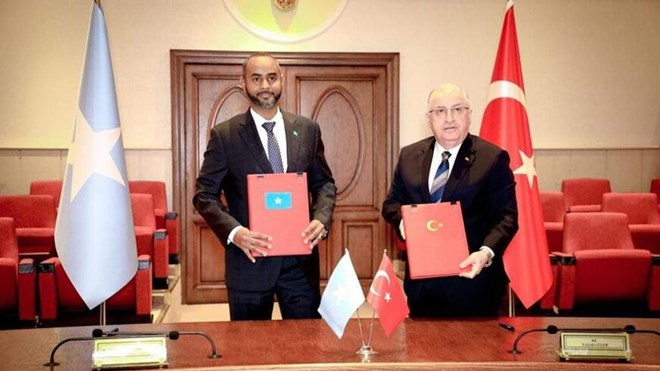
Security around the Horn of Africa is facing tensions not seen in decades. Houthi attacks on ships in the Red Sea and the Gulf of Aden is drawing in the US and UK, and a new Ethiopian-led port deal, has Somalia claiming its sovereignty is under threat. All are raising risks to this crucial global shipping route.
Amid this uncertainity, last week Somalia’s parliament passed a defence and economic agreement with Turkiye, which Mogadishu called a historic deal.
The 10-year pact is set to cover everything from strengthening maritime security, financial support and to step up the fight against terrorism. Somalia, which is still battling Al Shabab militants, also condemned a recent port deal between Ethiopia and the breakaway region of Somaliland. Turkiye, which has long provided financial and humanitarian support to Mogadishu, also operates its largest African embassy and overseas military facility in the country, where it is currently providing training for the Somali national army.
Strait Talk, hosted by Ayse Suberker, is TRT World’s programme that features in-depth analysis of Türkiye’s role in the world. Guests: Elem Eyrice Tepeciklioglu Associate Profe

by EMMANUEL WANJALA
Wednesday February 28, 2024
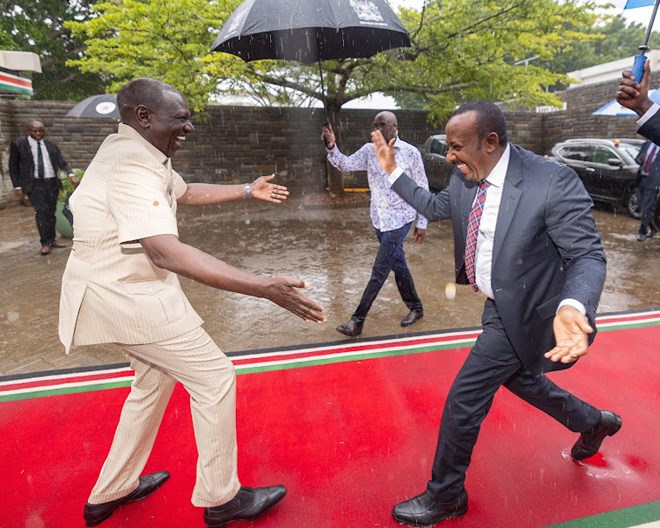
Ethiopia Prime Minister Abiy Ahmed is received by President William Ruto on arrival at the Jomo Kenyatta International Airport at the start of his State visit on February 27, 2024.
Image: PCS
Ethiopia Prime Minister Abiy Ahmed has arrived in the country on his first State visit since President William Ruto took over.
He was received by his host President William Ruto at the Jomo Kenyatta International Airport, JKIA.
Somali President Hassan Sheikh Mohamud said his country would “defend itself” if Ethiopia goes ahead with a deal to set up a naval base in the breakaway region of Somaliland and possibly recognise the territory as an independent state.
biy was last in Kenya on December 9, 2020, on an official visit for the launch of the One-Stop Border Post at Moyale in Marsabit.
His last State visit to Kenya was in June 2018 when he and then-president Uhuru Kenyatta vowed to elevate their ties to strategic levels.
Insiders said the agenda of the visit is security and economic collaboration, with a particular focus on Ethiopia’s strategic interest in utilising Kenya’s Lamu Port for maritime access.
The latest visit signals improved relations between Nairobi and Addis Ababa and offers a new opportunity to explore new avenues of collaboration in the region.
Kenya and Ethiopia share a 60-year-old historical defence agreement, rooted in the friendship between Jomo Kenyatta and Ethiopian Emperor Haile Selassie.
Prime Cabinet Secretary Musalia Mudavadi was on February 22 in Ethiopia where he signed key cooperation deals in seven sectors on behalf of the government.
These included MoUs on tourism, wildlife, culture, blue economy, petroleum, correctional services and capacity building in public service.
The deals were agreed upon during the 36th Joint Ministerial Commission meeting in Addis Ababa.
“I’m excited by this great opportunity to explore ways to strengthen the friendly relations between our two countries on economic, social, security and foreign relations,” Mudavadi said.
Besides bolstering the enhanced bilateral ties during Abiy’s visit, Ruto is also expected to capitalise on occasion to push for Ethiopia’s support of Azimio leader Raila Odinga’s bid for the AU chairmanship.
The President has taken to playing a pivotal role in ensuring his former political nemesis wins the AU top job which signals his exit from the local political scene.
Since declaring his candidature for the post on February 15, Raila has received backing not only from Ruto and his Azimio camp but also from regional leaders.
They include former Nigeria President Olusegun Obasanjo who said the Opposition chief is the best pick for the position.
Ruto also joined Raila in Uganda on Monday where their host Yoweri Museveni endorsed his candidature for the top AU job ahead of polls slated for 2015 during the next AU Summit.
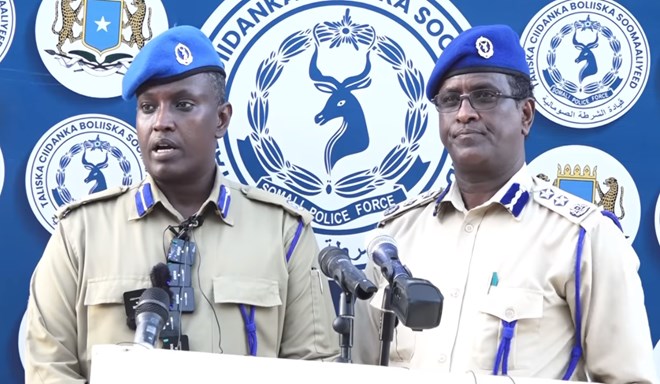
Mogadishu (HOL) – Somali Police Chief General Sulub Ahmed Firin has appointed Major General Qasim Ahmed Roble as the new spokesperson for the country’s police, replacing Major Sadiq Aden Ali-Doodishe.
During a press conference in Mogadishu on Sunday, Major Sadiq Aden Ali-Doodishe handed over his duties to his successor, who previously held the position.
“I have now officially handed over the role of spokesperson of the Somali Police Force to my commander, Major General Qasim Ahmed Roble. I have been working in the spokesman’s office for a while and handed it over to Major General Qasim Ahmed Roble this afternoon,” said Sadiq Doodishe.
The new spokesperson of the Somali Police thanked Sadiq Doodishe for his work during his tenure in office, promising to serve the nation and the Somali people well.
The appointment of the new Police Spokesperson, Qasim Ahmed Roble, marks the second time he has been appointed to this position, having previously held it from 2017 to 2019.

BY DENISE LAVOIE AND MATTHEW BARAKAT
Friday February 23, 2024

Special Operator Second Class Nathan Gage Ingram, right, and Special Operator First Class Christopher J. Chambers, in photos released by the U.S. Navy.Credit…U.S. Navy
Four foreign nationals were arrested and charged Thursday with transporting suspected Iranian-made weapons on a vessel intercepted by U.S. naval forces in the Arabian Sea last month. Two Navy SEALs died during the mission.
The criminal complaint unsealed Thursday in U.S. District Court in Richmond alleges that the four defendants — who were all carrying Pakistani identification cards — were transporting suspected Iranian-made missile components for the type of weapons used by Houthi rebel forces in recent attacks.
The flow of missiles and other advanced weaponry from Iran to Houthi rebel forces in Yemen threatens the people and interests of America and our partners in the region,” Deputy Attorney General Lisa Monaco said in a news release.
U.S. officials said that Navy Special Warfare Operator 1st Class Christopher J. Chambers was boarding the boat on Jan. 11 and slipped into the gap created by high waves between the vessel and the SEALs’ combatant craft. As Chambers fell, Navy Special Warfare Operator 2nd Class Nathan Gage Ingram jumped in to try to save him, according to U.S. officials familiar with what happened.
“Two Navy SEALs tragically lost their lives in the operation that thwarted the defendants charged today from allegedly smuggling Iranian-made weapons that the Houthis could have used to target American forces and threaten freedom of navigation and a vital artery for commerce,” Monaco said.
Attorney General Merrick B. Garland pledged that the Justice Department “will use every legal authority to hold accountable those who facilitate the flow of weapons from Iran to Houthi rebel forces, Hamas, and other groups that endanger the security of the United States and our allies.”
Muhammad Pahlawan is charged with attempting to smuggle advanced missile components, including a warhead he is accused of knowing would be used by the Houthi rebels against commercial and naval vessels in the Red Sea and surrounding waters. He is also charged with providing false information to U.S. Coast Guard officers during the boarding of the vessel.
Pahlawan’s co-defendants — Mohammad Mazhar, Ghufran Ullah and Izhar Muhammad — were also charged with providing false information.
Pahlawan’s attorney, Assistant Supervisory Federal Public Defender Amy Austin, said Pahlawan had an initial appearance in U.S. District Court Thursday and is scheduled to be back in court Tuesday for a detention hearing. She declined to comment on the case.
“Right now, he’s just charged with two crimes and we’re just at the very beginning stages, and so all we know is what’s in the complaint,” Austin said when reached by phone Thursday.
According to prosecutors, Navy forces boarded a small, unflagged vessel, described as a dhow, and encountered 14 people on the ship on the night of Jan. 11, in the Arabian Sea off the Somali coast.
Navy forces searched the dhow and found what prosecutors say was Iranian-made weapons, including components for medium range ballistic missiles and anti-ship cruise missiles.
All 14 sailors on the dhow were brought onto the USS Lewis B. Puller after Navy forces determined the dhow was not seaworthy. They were then brought back to Virginia, where criminal charges were filed against four and material witness warrants were filed against the other 10.
According to an FBI affidavit, Navy forces were entitled to board the ship because they were conducting an authorized “flag verification” to determine the country where the dhow was registered.
The dhow was determined to be flying without a flag and was therefore deemed a “vessel without nationality” that was subject to U.S. law, the affidavit states.
According to the affidavit, the sailors on the dhow admitted they had departed from Iran, although at least one of the men initially insisted they departed from Pakistan.
The affidavit states that crew members had been in contact multiple times by satellite phone with a member of Iran’s paramilitary Revolutionary Guard.
___
Barakat reported from Falls Church, Virginia. Lolita C. Baldor in Washington contributed.
Friday February 23, 2024
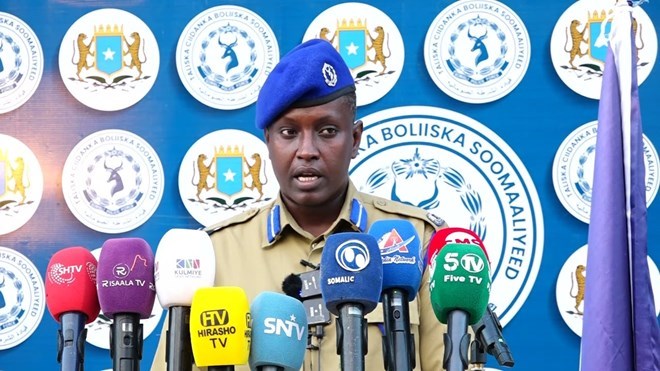
Mogadishu (HOL) – Police in Mogadishu have identified the people responsible for the abduction and killing of a young man in Mogadishu’s Heliwa district.
The spokesperson of the Somali Police Force, Major Sadiq Aden Ali Doodishe, told reporters on Thursday that the perpetrators who killed Abukar Ahmed Kaabah are known and will be apprehended soon.
“Investigations conducted by the security agencies have uncovered their identities, and efforts are underway to locate and apprehend them. Once captured, they will be brought to justice,” said the Somali Police Spokesman.
The victim, who was a well-known figure in Heliwa, was forcibly taken from a neighborhood in the district by four men in a Toyota SUV. Residents of the Garsbaaley neighborhood reported hearing gunfire around 3:00 a.m. Wednesday night. “This morning, we found his body dumped among the trees,” said one resident of Garsbaaley.
The abduction and murder add to a series of recent events that have shaken Mogadishu. Just days ago, the body of a federal government official from the breakaway region of Somaliland was discovered in the city, further heightening concerns about security in the area.
Friday February 23, 2024
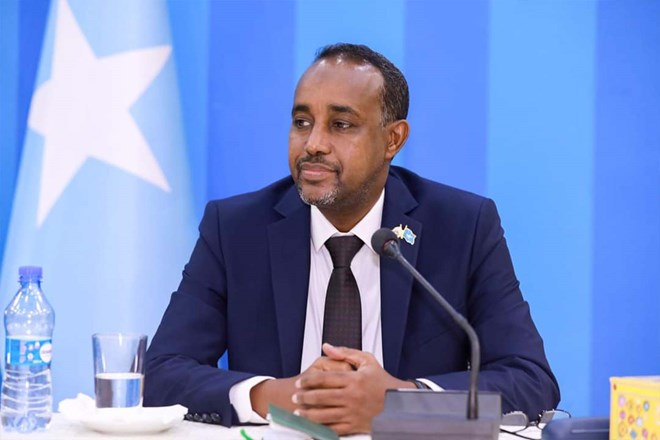
Mogadishu
Former Somali Prime Minister Mohamed Hussein Roble has urged the Somali people and politicians to fully support the Turkey-Somalia defense and economic cooperation agreement to protect the country.
Speaking to local media on Thursday, Roble described the agreement as historic and important for both countries, emphasizing that it will enhance the security and development of Somalia.
“This agreement protects Somalia from all obstacles, whether countries stealing fish, engaging in unauthorized activities in our seas, pirates harming our people, or foreign interference. The rebuilding of our naval force will benefit Somalia,” he said.
Somali President Hassan Sheikh Mohamud enacted the ten-year Turkey-Somalia Defense and Economic Cooperation Agreement on Thursday, following its approval by the country’s executive and legislative branches.
The Turkish Defense Ministry also stated that Turkey would assist Somalia in developing its maritime security under a defense cooperation deal signed in Ankara earlier this month.
“Upon Somalia’s request, we will provide support in the field of maritime security, as we did in the fight against terrorism,” a senior official from the Turkish Defense Ministry told reporters. “Hence we will help Somalia develop its capacity and capabilities to combat illegal and irregular activities in its territorial waters.”
The new agreement comes amid increasing tension between Somalia and Ethiopia, sparked by signing a memorandum of understanding (MOU) between Ethiopia and Somalia’s breakaway Somaliland region. Somalia has strongly rejected the MOU, alleging that Ethiopia aims to annex parts of Somalia’s territory. President Hassan Sheikh has voiced this concern at African Union meetings and on other occasions.
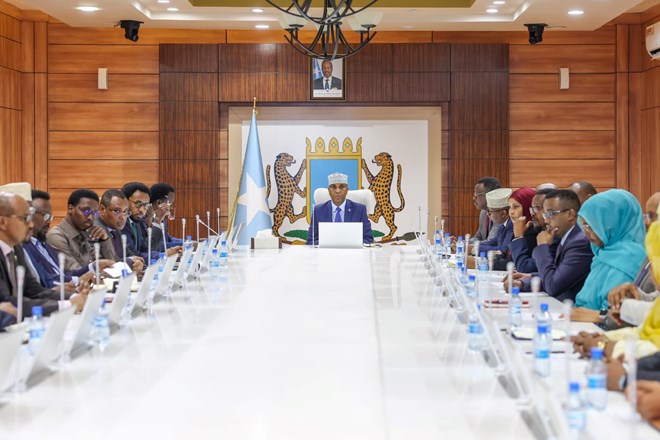
Mogadishu (HOL) – Somalia’s Council of Ministers approved the recent agreement between Turkey and Somalia on defense and economic cooperation on Wednesday, as President Mohamud is expected to address the parliament today regarding the agreement and the diplomatic dispute between Somalia and Ethiopia.
Prime Minister Hamsa Abdi Barre, who chaired the extraordinary meeting of the Council in Mogadishu, described the agreement as historic for the Somali nation and emphasized its importance for the country and its people.
This agreement marks a new path for Somalia that was previously inaccessible. It establishes Somalia as a true friend and removes obstacles,” Barre stated after the meeting.
Prime Minister Barre emphasized that the agreement would address concerns related to terrorism, piracy, illegal fishing, pollution, abuse, and external threats.
“This agreement will facilitate the Navy’s development, training, and equipping for maritime defence. It will also enhance our maritime economy,” Prime Minister Hamsa added.
He expressed gratitude to the government and people of Turkey for their support during critical times in Somalia’s history, particularly in the face of recent violations of the country’s sovereignty.
He expressed gratitude to the government and people of Turkey for their support during what he called critical times in Somalia’s history and today in the face of recent violations of the country’s sovereignty.
Earlier this month, the defence ministers of Turkey and Somalia signed a defence and economic cooperation agreement in Ankara aimed at strengthening bilateral relations and regional stability.
Turkish National Defense Minister Yasar Guler, who signed the agreement with his Somali counterpart Abdulkadir Mohamed Nur, emphasized Somalia’s significance as a partner for Turkey in Africa.
“We had a fruitful meeting with my counterpart. In our discussions, which were held in a warm atmosphere and further solidified our relations, we reiterated our commitment to Somalia’s sovereignty and territorial integrity,” Guler remarked after the meeting.
“We had a productive meeting with my counterpart. In our discussions, which took place in a very warm atmosphere and further strengthened our relations, we reiterated the importance we attach to Somalia’s sovereignty and territorial integrity,” Guler said after the meeting.
Tensions in the Horn of Africa have escalated after landlocked Ethiopia reached a memorandum of understanding with Somaliland on January 1 that gives it access to the sea.
The Somali government vehemently rejected the MoU, saying that the pact had no legal validity and would endanger regional stability. Somalia said there was no room for mediation in a dispute with Ethiopia unless Addis Ababa cancelled a controversial deal with the breakaway region of Somaliland.
Tanzanians criticise Nyerere’s statue in Ethiopia
Some Tanzanians online are saying the statue of their founding father doesn’t look like him.
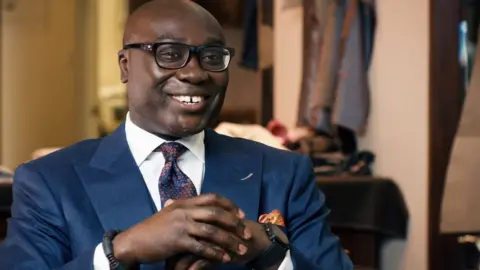
BBC launches 2024 Komla Dumor Award
The BBC is seeking a future star of African journalism for the BBC News Komla Dumor Award 2024.
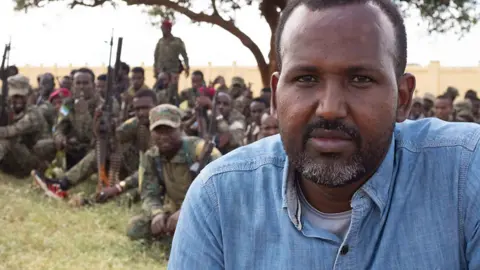
Award-winning journalist arrested in Somalia – reports
Sources tell the BBC that Jamal Osman, who works for the UK’s Channel 4, is due to be deported from Somalia.
Somalia president accuses Ethiopia of trying to annex part of its territory
President Mohamud ‘categorically objects’ to Ethiopia’s Red Sea port deal with Somaliland, territory Somalia claims as its own.
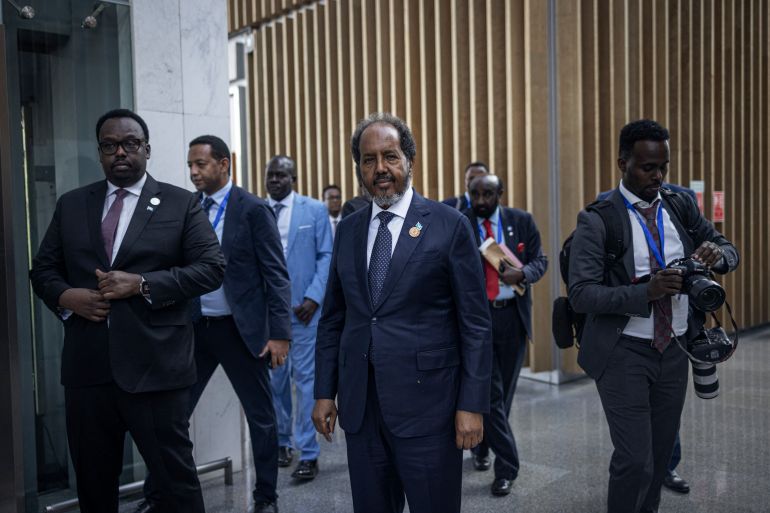
Published On 17 Feb 202417 Feb 2024
Somali President Hassan Sheikh Mohamud has accused Ethiopia of trying to annex part of his country’s territory by signing a sea access deal with the breakaway region of Somaliland.
Speaking at the African Union summit in Ethiopia’s capital, Addis Ababa on Saturday, Mohamud also said Ethiopian security forces tried to block his access to the summit amid a dispute between the two countries.
KEEP READING
list of 3 itemslist 1 of 3
Somalia has joined the EAC regional bloc. What happens next?
list 2 of 3
Somalia rejects mediation with Ethiopia gov’t over Somaliland port deal
list 3 of 3
Could Ethiopia and Somalia go to war?
end of list
The agreement between Ethiopia and Somaliland signed on January 1 “is nothing more than annexing part of Somalia to Ethiopia, and changing the borders of Somalia,” Mohamud told reporters. “Somalia categorically objects to that.”
As part of the deal, signed by Ethiopian Prime Minister Abiy Ahmed and Somaliland’s leader Muse Bihi Abdi, Somaliland grants Ethiopia a 50-year lease on a naval base with access to Somaliland’s Berbera port for commercial marine operations.
Neither side has made the terms of the deal public, but it appears to give Ethiopia the right to build a port in Somaliland in exchange for recognition.
Somaliland has enjoyed de facto independence for three decades, but Somalia considers the self-governing region and its four million people to be a part of its northern territory.
Mogadishu regards any international recognition of Somaliland as an attack on Somalia’s sovereignty, and the Somali government has called the port deal with Addis Ababa “outrageous” and “unauthorised”.
“Ethiopia is misleading the world by claiming that they need an access to the sea,” Mohamud said on Saturday. “The question is not an access to the sea. The question is how Ethiopia wants access to the sea.”
He claimed senior officers from Ethiopia’s military were in Somaliland “preparing the ground” for the territory’s annexation. It was not possible to verify his allegation.
Somalia has suggested it would be prepared to go to war to stop Ethiopia from building a port in Somaliland. But Ethiopia’s Abiy has played down fears of an armed conflict over the Somaliland deal, telling lawmakers earlier this month that he had “no intention” of going to war with Somalia.
ISLAMABAD —
Somalia has condemned what it calls “a provocative attempt by the Ethiopian government,” claiming that Ethiopian security forces tried to block Somali President Hassan Sheikh Mohamud from accessing the African Union Summit in Addis Ababa, a government statement said Saturday.
“The Federal Republic of Somalia strongly condemns the provocative attempt by the Ethiopian government to obstruct the delegation of the Somali President from attending the 2024 African Union Summit in Addis Ababa,” said the statement released by the Somali National News Agency SONNA.
“This action breaches all diplomatic and international protocols and, most critically, the established traditions of the African Union. This behavior adds to the growing list of erratic actions by the Ethiopian government in recent times,” said the statement.
Ethiopia hosts the African Union headquarters, and Mohamud — leading a delegation from the Somalia government — went there to attend the AU summit at a time when both countries already are at odds over a controversial maritime pact between Ethiopia and Somaliland.
“Given that Ethiopia hosts the African Union headquarters, its leadership and government have an obligation to treat all African leaders equally,” the Somali government statement said.
“Hosting the AU is both an honor and a privilege for Ethiopia; however, if its government fails to uphold this honor and responsibility with the necessary decorum, it may be necessary for the African Union to reevaluate the location of its headquarters,” the statement added.
Mogadishu described the incident as “outrageous conduct” and called for a full investigation by the pan-African body.
“While we denounce Ethiopia’s unwarranted action, we also call upon the AU to urgently conduct a credible and independent investigation to this outrageous conduct in line with the protocols of the union,” the statement said.
“This morning when I prepared myself to come and attend the closed session of the summit, the Ethiopian security blocked my way,” Mohamud told reporters, after later gaining entry to the venue for the meeting.
He said he had tried again with another head of state, Djibouti President Ismail Omar Guelleh, but they were also blocked from the AU headquarters, a claim challenged by Ethiopia.
“A soldier with a gun stood in front of us and denied us access to this facility,” he said.
Agence France-Presse has reported that Ethiopia insisted Mohamud was warmly welcomed and said the Somali delegation was blocked when its security detail tried to enter a venue with weapons.
Ethiopian Prime Minister Abiy Ahmed’s spokeswoman, Billene Seyoum, told AFP that Ethiopia had “warmly welcomed” Mohamud and accorded him the full honors of visiting heads of state and governments to the summit.
She said the Somali delegation had declined the security offered by Ethiopia and tried to enter a venue with their weapons.
“As host country, the government of Ethiopia is responsible for the security of all heads of state and government while in the country,” Seyoum said.
“The Somali delegation security attempted to enter the AUC [African Union Commission] premises with weapons, which was blocked off by AUC security.”
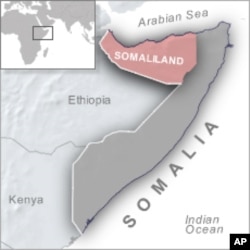
Somalia has accused Ethiopia of violating its sovereignty and territorial integrity over the January 1 memorandum of understanding with Somaliland that declared independence in 1991 in a move not recognized by the international community.
Under the maritime deal, Somaliland agreed to lease 20 kilometers (12.4 miles) of its coast for 50 years to Ethiopia, which wants to set up a naval base and a commercial port on the coast.
In return, Somaliland — a former British protectorate — has said Ethiopia would give it formal recognition, assertions not confirmed by Addis Ababa.
Ethiopia, the second most populous country in Africa and one of the largest landlocked nations in the world, was cut off from the coast after Eritrea seceded and declared independence in 1993 following a three-decade-long war.
Addis Ababa had maintained access to a port in Eritrea until the two countries went to war in 1998-2000, and since then, Ethiopia has sent most of its sea trade through Djibouti.
While Somaliland is largely stable, Somalia has witnessed decades of civil war and a bloody Islamist insurgency by the al-Qaida-linked al-Shabab militant group.